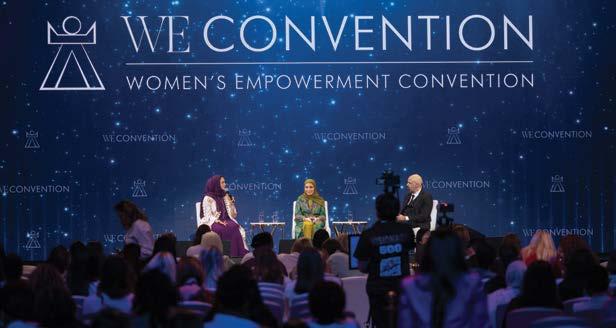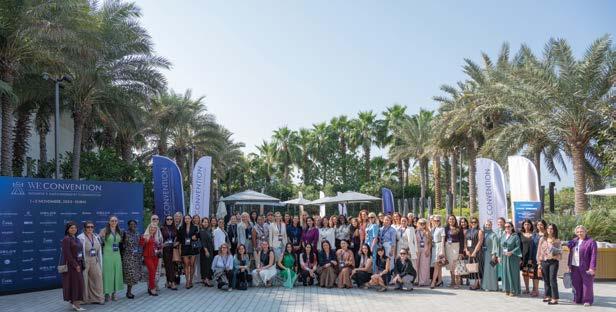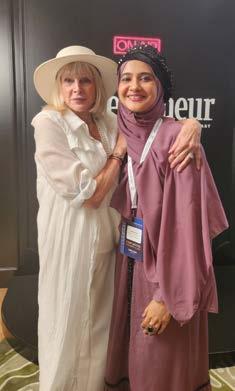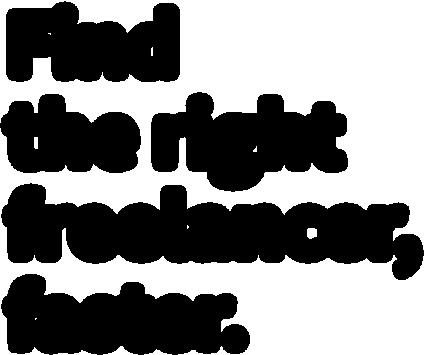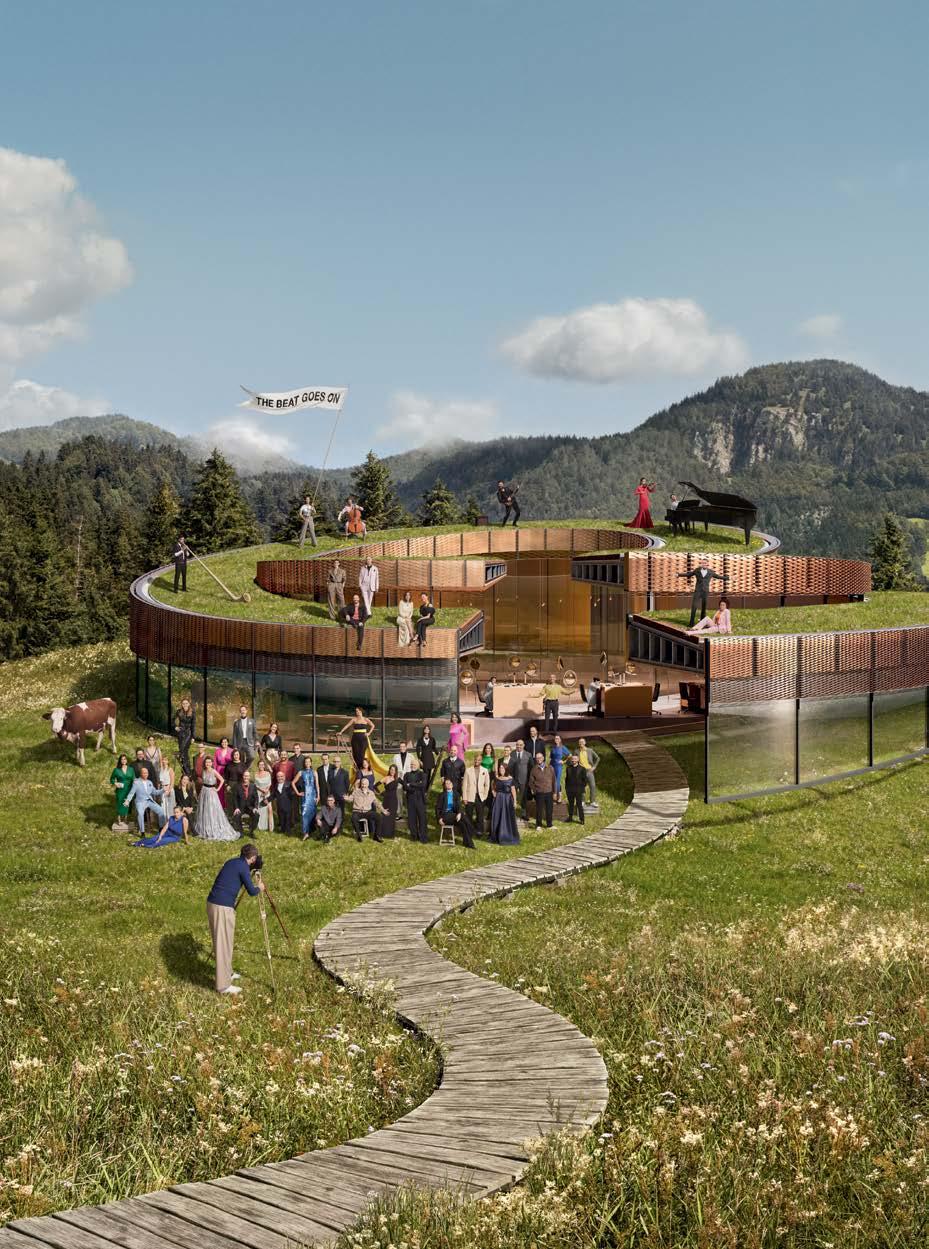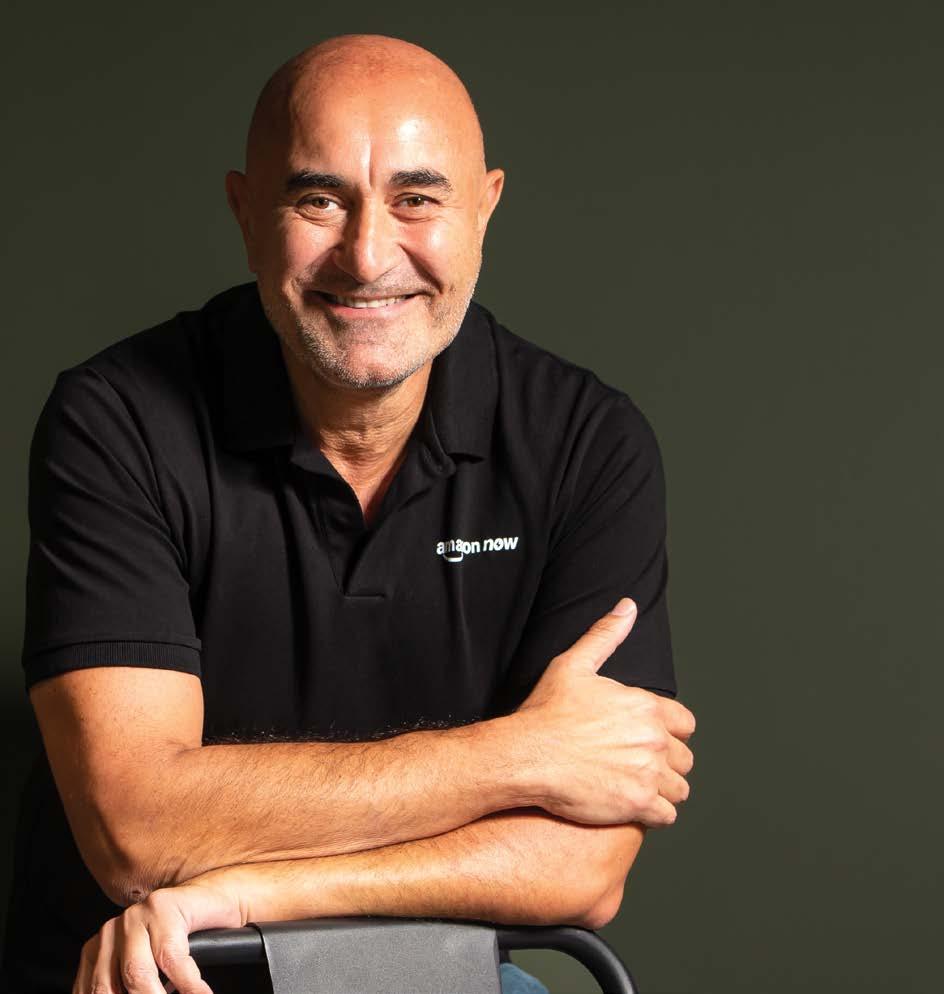
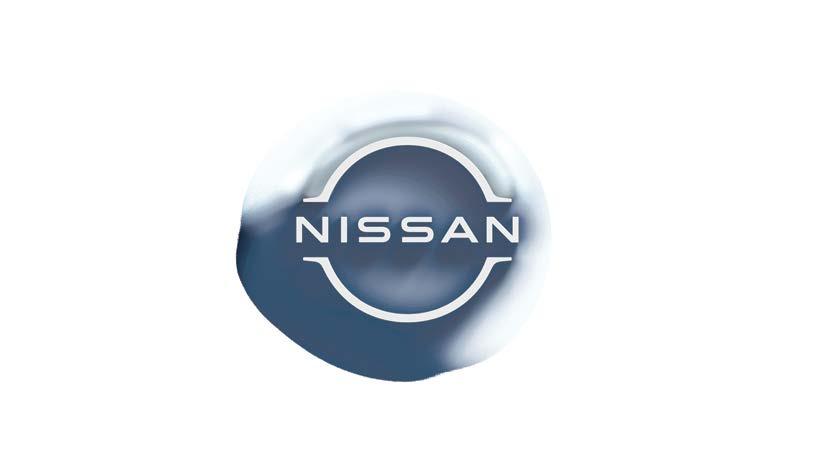
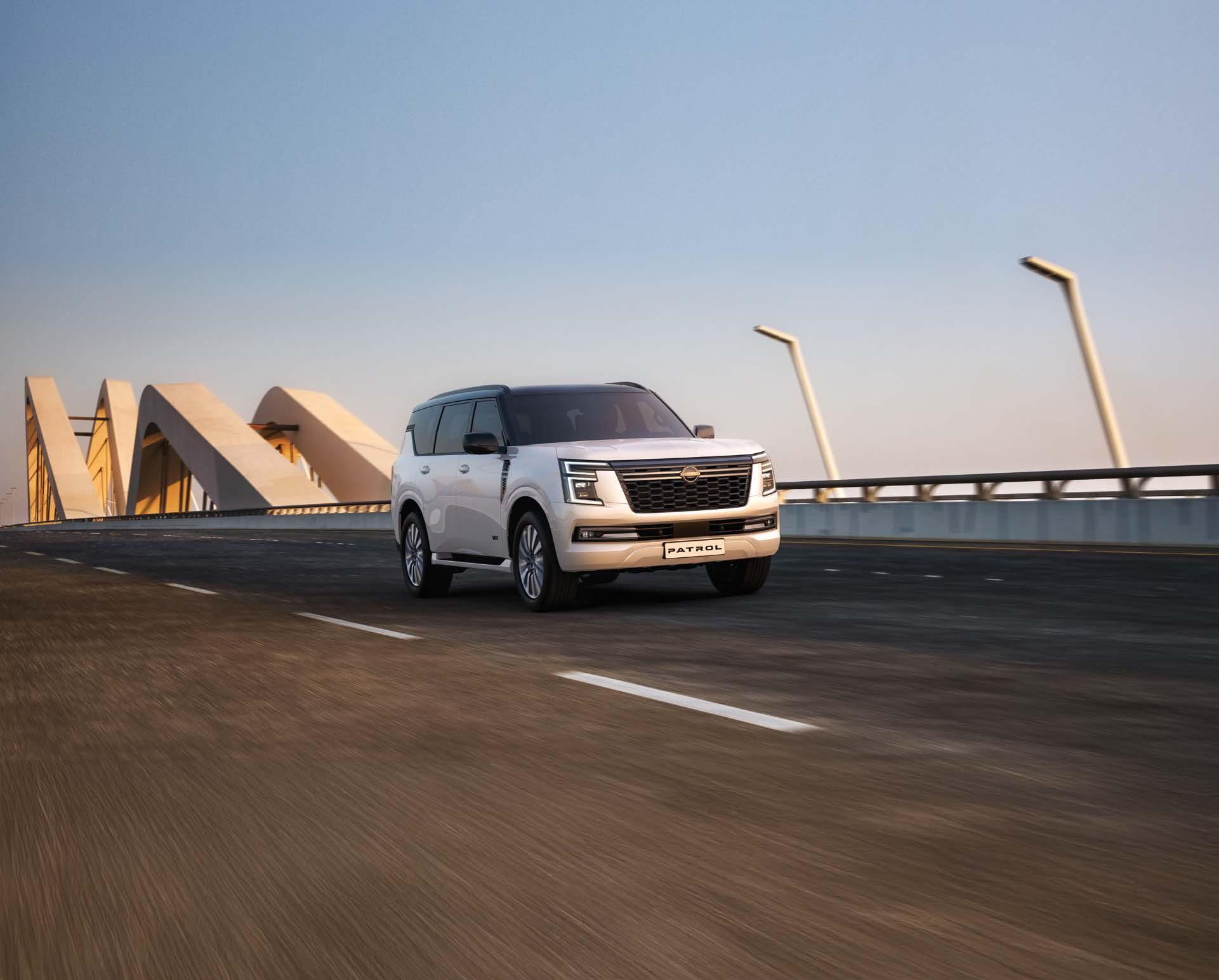


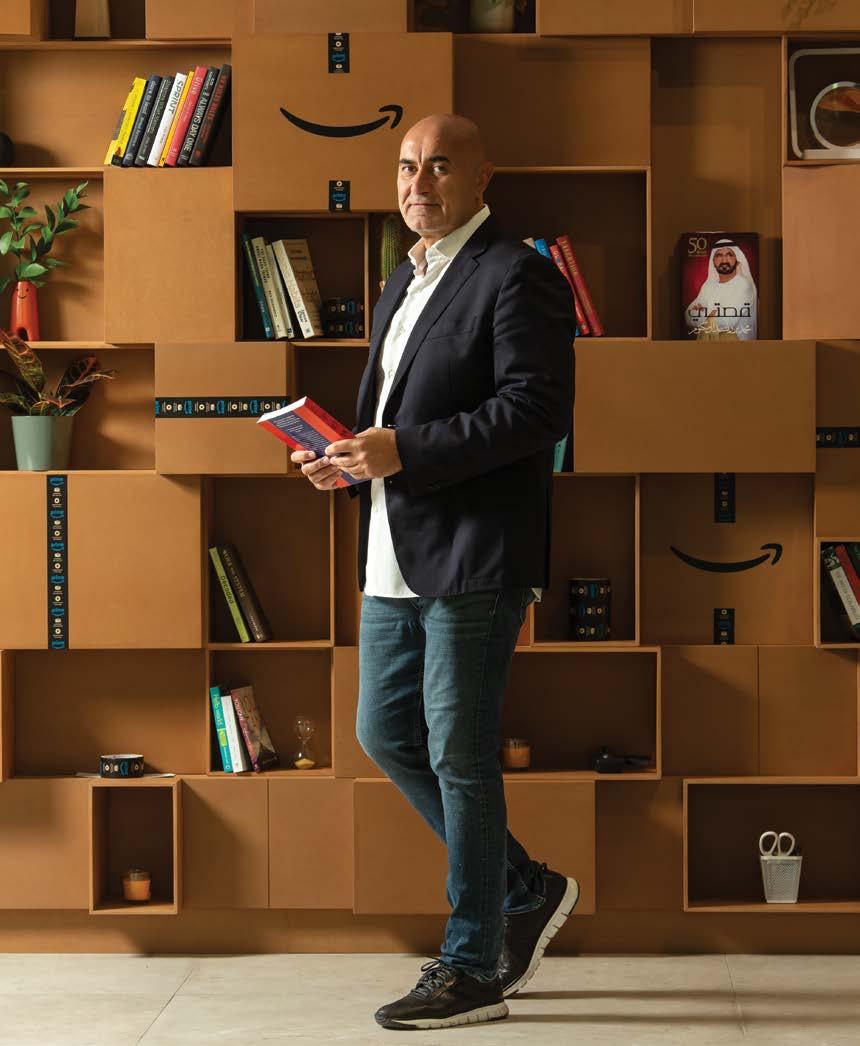



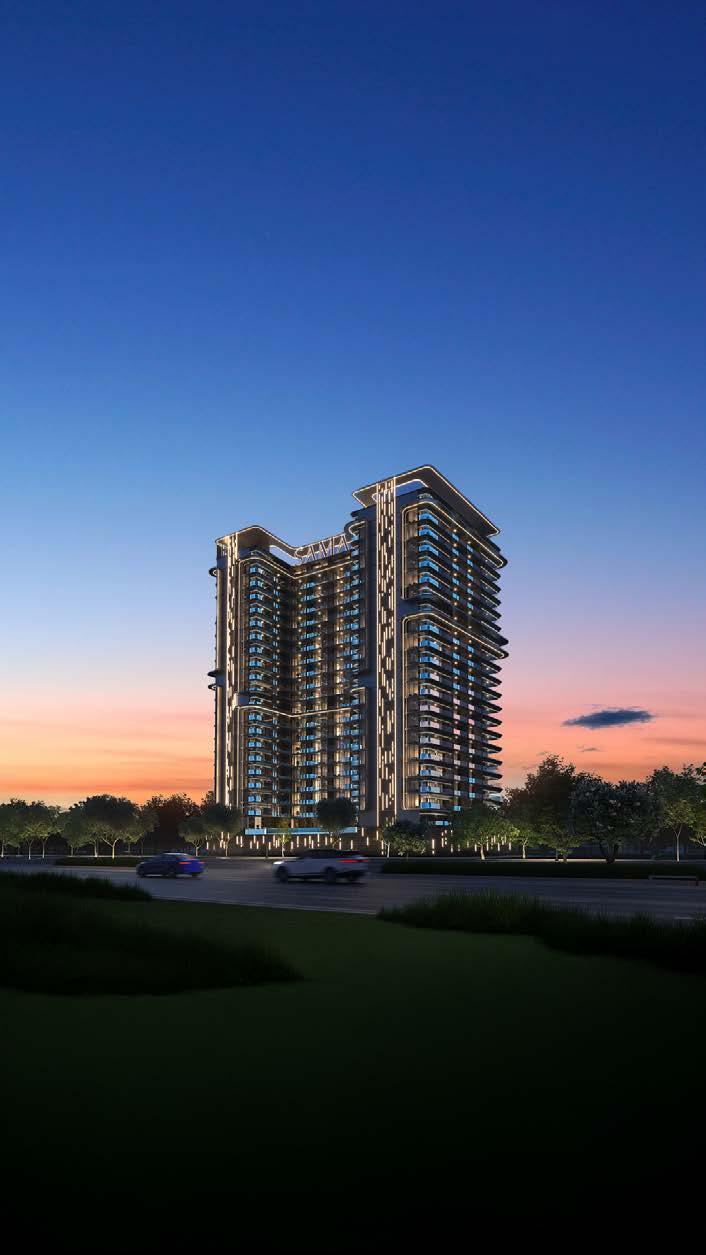
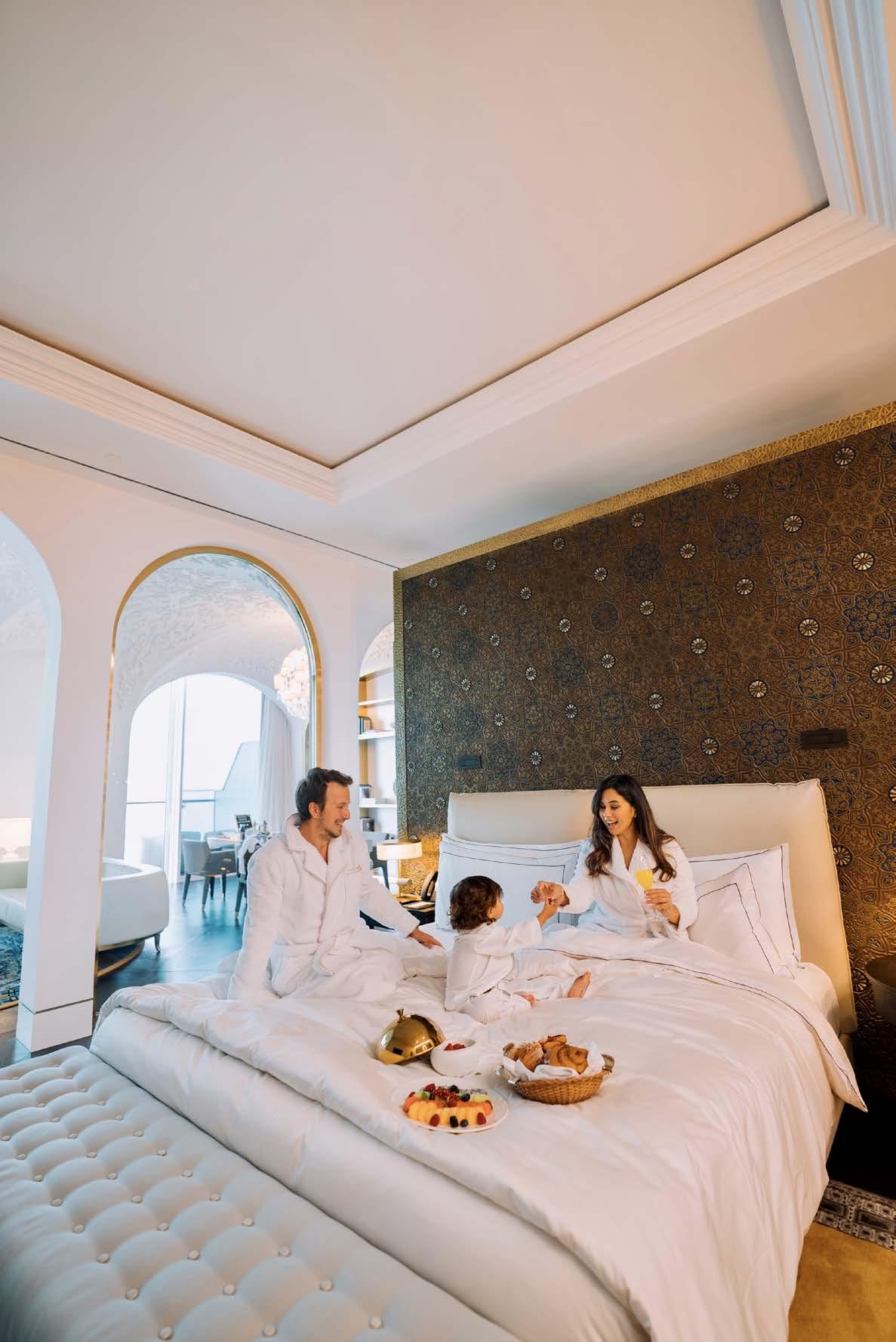














Step into a world of opulence when you book a Suite at Raffles Doha.
Experience the added luxury of QAR 750 credit to spend on dining in the hotel, and QAR 500 towards any Spa treatment.
Children aged 12 and below are welcome to indulge in the enchantment of complimentary dining.
Rates starting from QAR 3,500 per night
For reservations, please call +974 4030 7100 or email reservations.doha@raffles.com
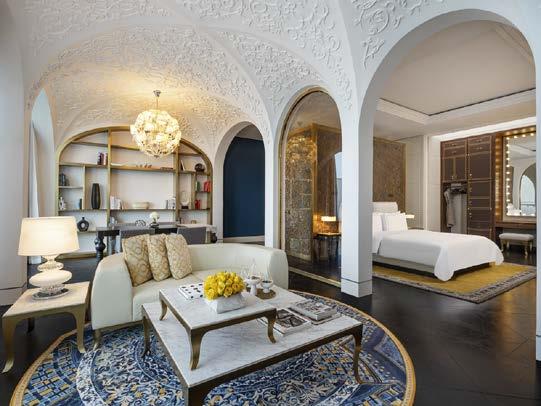

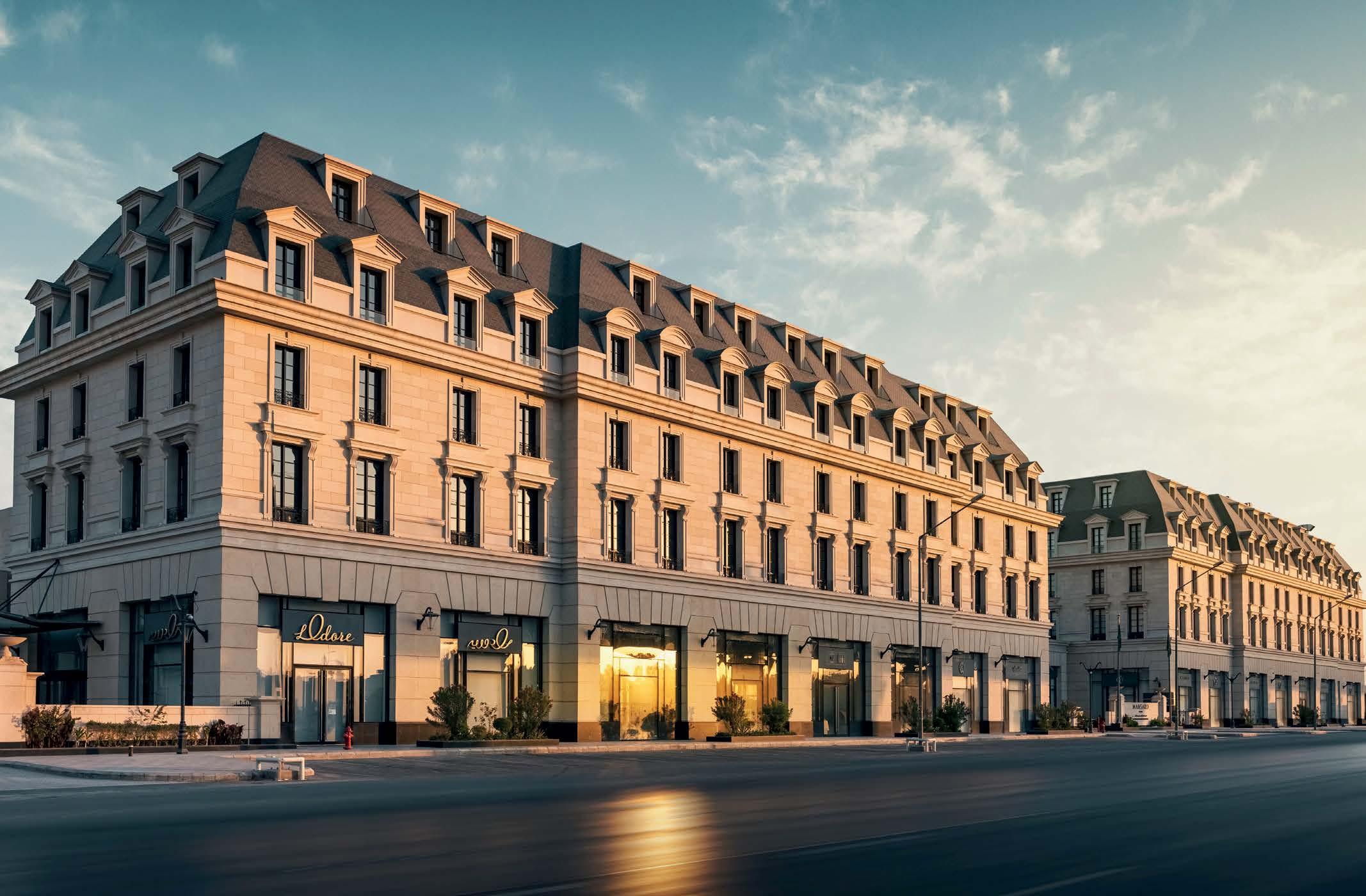


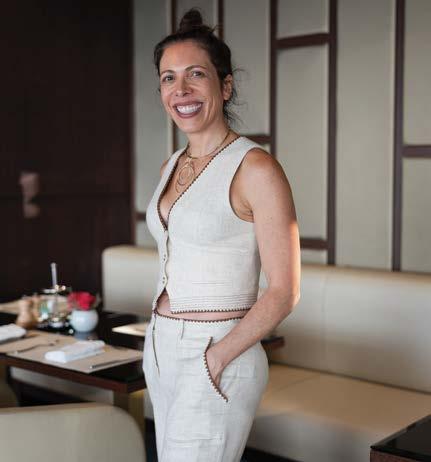
How LINDA ROTTENBERG changed the world for entrepreneurs
20 Expanding Horizons
How MONTYPAY is redefining payment solutions across the globe
34 Claim Your Space
Ti22 Films and Dubai On Demand founder REIM EL HOUNI is on a mission.
40 Eco-Honest Practices
How LUBOMILA JORDANOVA built Europe’s leading corporate carbon accounting and decarbonisation software provider.
MENA region’s leading venture capitalists share practical advice to help founders navigate the challenges of building and scaling a startup.
mission to redefine global supply chains.
45
How
CEO Wissam Younane wissam@bncpublishing.net
MANAGING DIRECTOR Rabih Najm rabih@bncpublishing.net
ART DIRECTOR Simona El Khoury
EDITOR IN CHIEF Anil Bhoyrul anil@bncpublishing.net
MANAGING EDITOR Tamara Pupic tamara@bncpublishing.net
FEATURES EDITOR Aalia Mehreen Ahmed aalia@bncpublishing.net
DIRECTOR OF INNOVATION
Sarah Saddouk sarah@bncpublishing.net
GROUP SALES DIRECTOR – B2B GROUP Joaquim D’Costa jo@bncpublishing.net
HEAD OF PARTNERSHIPS
Samir Glor Samir@bncpublishing.net
COMMERCIAL LEAD
Anna Chipala anna@bncpublishing.net
COLUMNIST Tamara Clarke
CONTRIBUTING WRITERS Fida Chaaban
SUBSCRIBE
Contact subscriptions@bncpublishing.net to receive Entrepreneur Middle East every issue
COMMERCIAL ENQUIRIES sales@bncpublishing.net
ENTREPRENEUR.COM
Access fresh content daily on our website
EntMagazineME Entrepreneur-me
PO
DUBAI, UAE P +971 4 4200 506
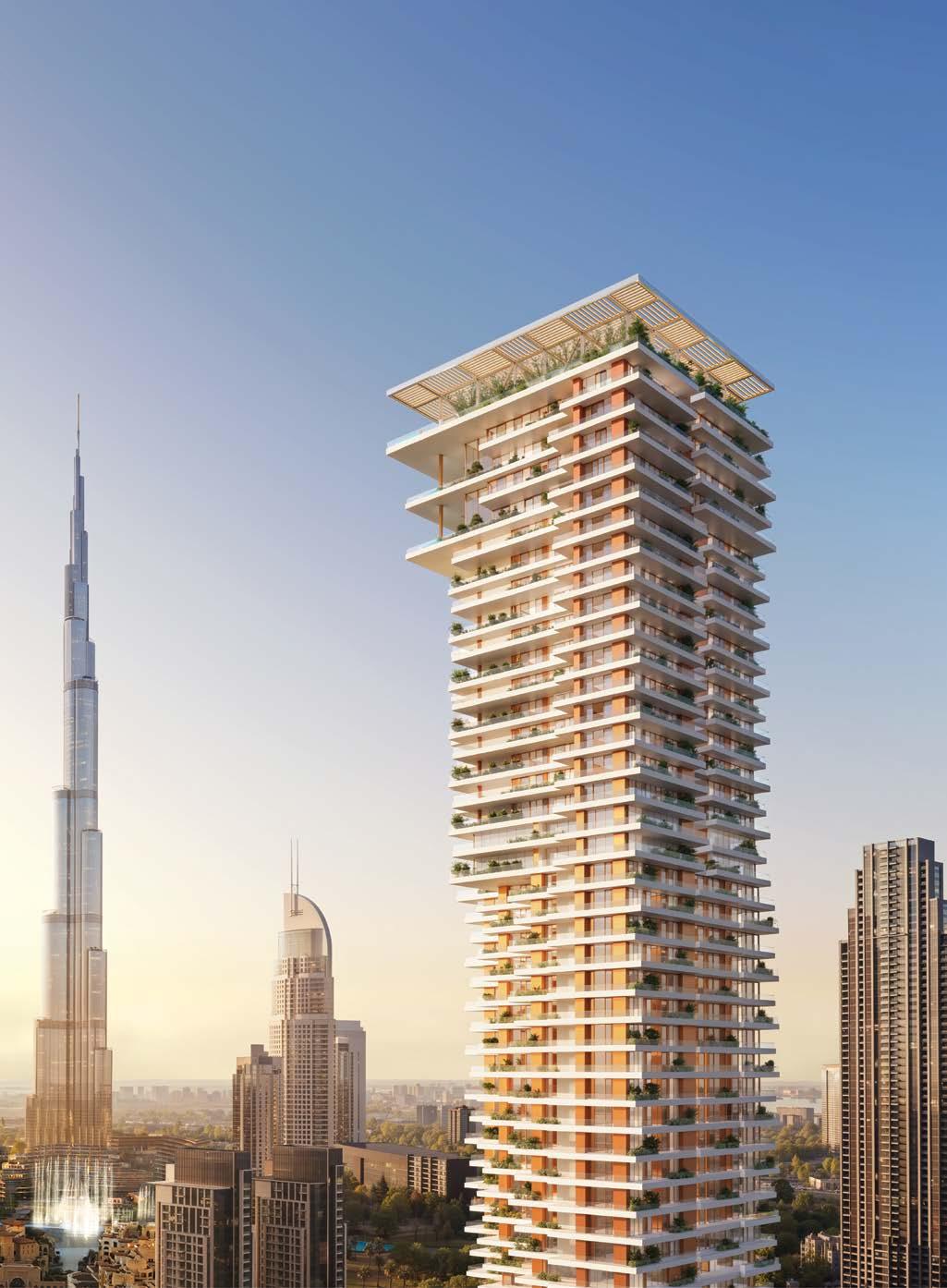




How a wave of sports-tech entrepreneurs is helping transform the Kingdom’s economy—and the way its people play.

Afew years ago, few would have predicted that Saudi Arabia would become a hotbed for sports innovation. Yet today, startups are emerging at the heart of the Kingdom’s push to build a vibrant, tech-driven sports economy. The recent “ASICS Innovation Pitch,” launched by the Saudi Sports for All Federation (SFA) and ASICS, is a case in point—an initiative designed to uncover local entrepreneurs developing digital solutions for fitness and well-being. Winners like Amplifai Health, Harwalah
Fit, and Fitness Storm are now turning their ideas into pilots that could reshape everyday participation in sport. This momentum is part of a much larger play. Saudi Arabia’s total sports market, valued at around US$8.4 billion in 2024, is projected to surge to US$22.5 billion by 2030, according to recent industry analyses. Within that, the sports technology sector alone—spanning fitness apps, analytics tools, and fan engagement platforms—is expected to grow from roughly US$300 million in 2023 to over US$1 billion by 2030. Such figures signal not just diversification, but an entirely new commercial landscape. From a personal standpoint, what makes this exciting is the inclusivity of these ventures. Unlike traditional sports investments that focus on elite athletes or global events, Saudi sports startups are tackling public health, community engagement, and accessibility. They’re creating platforms that inspire more people to move— whether through gamified fitness, AI-powered training, or digital coaching ecosystems. This aligns directly with Vision 2030’s ambition to get more citizens physically active and make sport a core part of national life. Still, the next step is critical. Turning pilot projects into scalable, sustainable enterprises will require not only investment but also education, data policy, and grassroots adoption. Yet as the sector matures, one thing is clear: the future of Saudi sport may be shaped less by stadiums and star signings—and more by the startups building the technology that gets a nation moving.
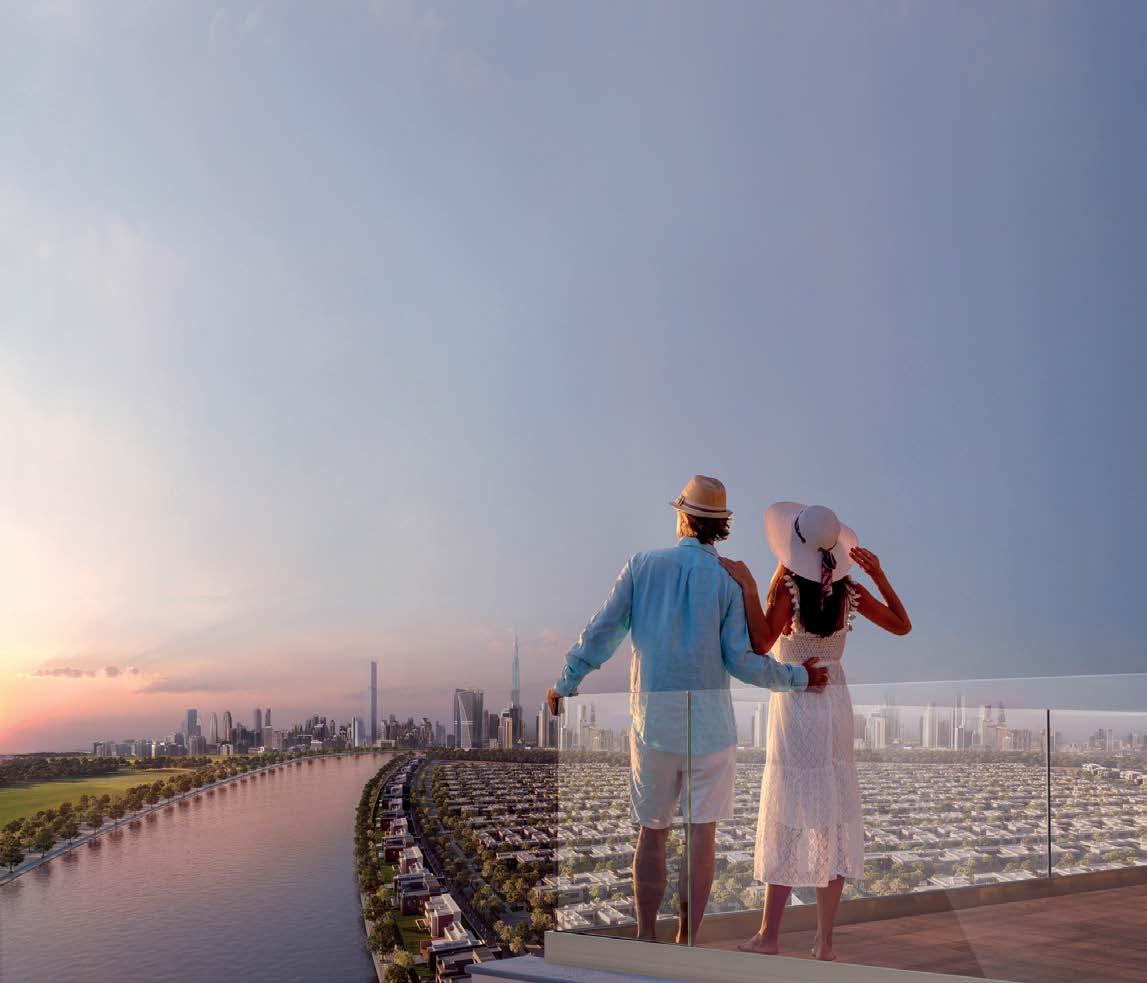
Anil Bhoyrul Editor-in-Chief


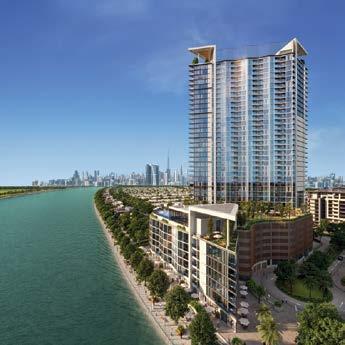


Enlighten Your Eternal Beauty, Inside and Out!
@muarjewels www.muarjewels.com
info@muarjewels.com
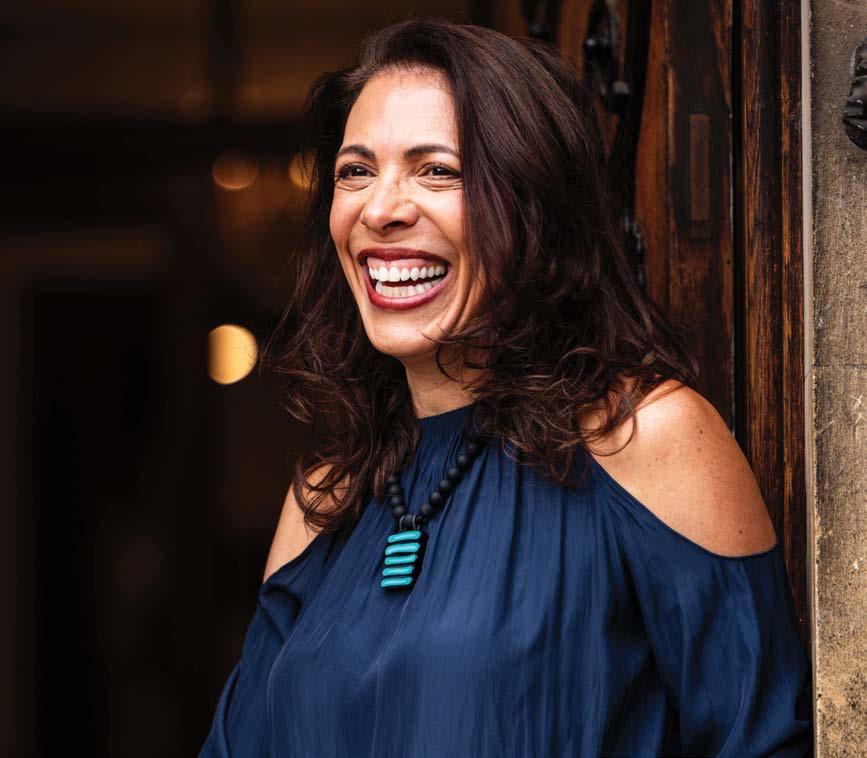
“Talent is everywhere. Opportunity is not. We’re here to fix that — to showcase the founders building extraordinary companies elsewhere — and the Middle East is leading the way.”
by WISSAM YOUNANE

She was once known as the “crazy girl” – but today, the only thing crazy about Linda Rottenberg, the co-founder and CEO of Endeavor, is her never ending success. Through her global organization supporting highimpact entrepreneurs, Rottenberg has spent nearly three decades proving one idea that once seemed outrageous: that world-changing entrepreneurs can come from anywhere.
“Yes..they called me ‘Chica Loca’ — the crazy girl,” she laughs, recalling the early days when she was told entrepreneurship only belonged to Silicon Valley. “But I knew the world was full of people with the drive, creativity, and courage to build extraordinary companies — they just needed the right ecosystem around them.”
Today, Endeavor operates in 50+ markets, supports over 3,000 entrepreneurs, and collectively represents nearly US$90 billion in annual revenue and 4 million jobs. The organization has become the backbone of global entrepreneurship — and in many ways, the Middle East has become one of its boldest chapters.
Rottenberg’s admiration for the UAE is immediate.
“I love Dubai,” she says. “We’re hosting 30 Endeavor entrepreneurs here this week
— from Latin America, Africa, Europe, Asia, and across the Middle East — because the UAE has become this incredible hub for talent, markets, and capital. It’s thrilling.”
For Rottenberg, the region’s transformation from untapped potential to global player has been nothing short of remarkable. “When we started, very few people in MENA called themselves entrepreneurs,” she says. “Today, we’re watching founders in Riyadh, Cairo, and Dubai build companies that are scaling globally.”
When Rottenberg launched Endeavor in 1997, investors dismissed her vision of scaling startups in emerging markets. “People told me it was impossible,” she recalls. “No capital, no trust, no networks — they said entrepreneurs couldn’t scale in places like Latin America, Africa, or the Middle East. But I knew they could.”
Endeavor’s results silenced the doubters. The organization’s founders have produced nearly 90 unicorns, including names like MercadoLibre, Rappi, Careem, and Kitopi. Its influence now extends across continents, empowering founders who solve problems far beyond convenience tech.
“In Silicon Valley, you see startups solving how to get coffee faster,” Rottenberg says. “In MENA, founders are solving real-world challenges — from logistics
and food security to financial inclusion. That’s innovation born out of necessity, not luxury.”
Endeavor’s story in the region began with a single conversation.
“I was in Amman in 2007, co-chairing the World Economic Forum,” Rottenberg recalls. “That’s when I met Fadi Ghandour, the founder of Aramex. He told me, ‘We need Endeavor here.’ And
that’s how it started — with Jordan.”
Soon after came Egypt, Saudi Arabia, Lebanon, the UAE, and Pakistan.
“Back then, the region had pioneers — Maktoob, Souq, Bayt, Property Finder — founders who believed before anyone else did. They didn’t have easy access to capital or mentorship, but they had grit. They were the ones who proved the region could produce scale.”
Now, she says, MENA is seeing its second wave: the
multipliers — founders investing back into the ecosystem.
“The first generation built companies. The second is building ecosystems.”
“These are people like Mudassir Sheikha of Careem, Mona Ataya of Mumzworld,, Michael Lahyani of Property Finder, or Mo Ballout of Kitopi,” Rottenberg adds.
“They’re mentoring, funding, and advising the next generation. That’s how an ecosystem becomes self-sustaining.”
TALENT IS EVERYWHERE. OPPORTUNITY IS NOT. WE’RE HERE TO FIX THAT — TO SHOWCASE THE FOUNDERS BUILDING EXTRAORDINARY COMPANIES ELSEWHERE — AND THE MIDDLE EAST IS LEADING THE WAY.”
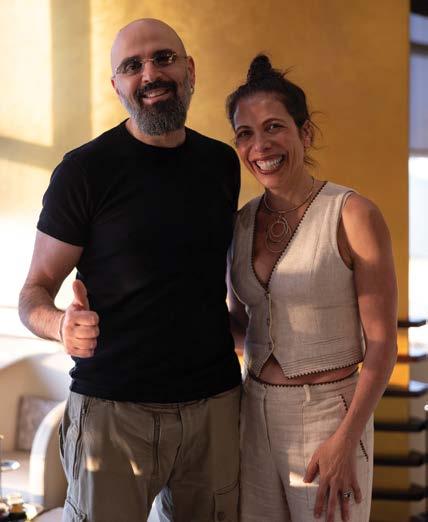
→
Linda Rottenberg and Wissam Younane, CEO, BNC Publishing
Scaling: The Hardest Part No One Talks About “Everyone loves the startup story,” Rottenberg says.
“But scaling is the real test.”
Once a company reaches momentum, challenges evolve: leadership gaps, co-founder conflicts, hiring at pace. “It’s not about starting up — it’s about growing up,” she says.
Endeavor’s model focuses exactly on that stage. “We’re the community for the middle — the founders who’ve moved past seed funding but need help to scale to $50 or $100 million in revenue. That’s when the loneliness sets in — and the right peer network can make all the difference.”
Where Are MENA’s IPOs? Rottenberg doesn’t shy
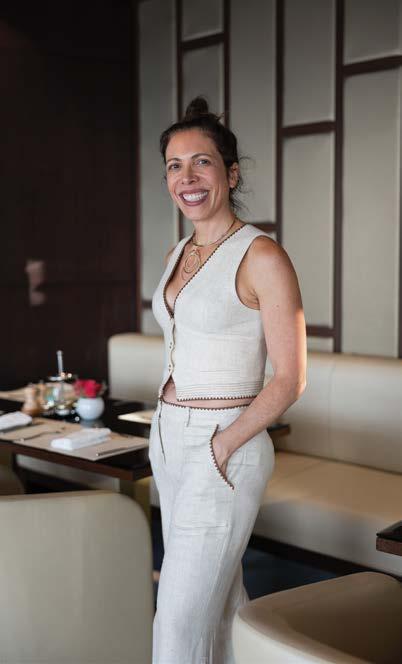
away from tough questions. “We’ve seen huge acquisitions — Careem to Uber, Souq to Amazon, Maktoob to Yahoo — but now the region needs IPOs,” she says.
She references Mercado Libre, the Latin American giant that turned down an acquisition offer from eBay to go public. “That company is now worth US$110 billion. It was the moment Latin America said, ‘We can build our own global giants.’ The Middle East is ready for that moment too.”
Resilience: The Region’s Hidden Advantage
If there’s one trait that defines MENA founders, Rottenberg says, it’s resilience.
“No one needs a workshop on resilience here,” she laughs. “It’s embedded in the DNA.”
She shares a story from an Endeavor Outliers Retreat: “We had founders from Lebanon and Ukraine comparing notes — literally talking about how they build during crises, even during bombings. They just keep going. That’s why I say: chaos isn’t the enemy of entrepreneurship. It’s the fuel.”
“People overvalue stability. But stability favors the incumbents. Chaos favors the entrepreneurs.”
Asked about women in business, Rottenberg leans forward. “There’s this myth that there’s only room for one woman at the top,” she says. “That’s scarcity thinking. The reality is, when more women rise, everyone wins.”
She points to Saudi Arabia’s shift as a powerful case study.
“In many Saudi companies, women make up 40 to 60 percent of engineering teams. That’s transformational. The next wave of regional unicorns will absolutely have women at the top.”
Her advice to female leaders: “Align incentives, not egos. It’s not a zero-sum game.”
Rottenberg has a clear read on the investment scene.
“During boom cycles, you get tourist investors — the ones who show up when it’s hot and disappear when things cool down,” she says.
“What you really need are builder investors — people who’ve built companies themselves.”
In Latin America, she notes, the top venture firm Kaszek Ventures was founded by ex-MercadoLibre founders.
“That’s what we need in MENA — local capital with entrepreneurial DNA. Family offices are entering the space, but they need to think long-term. Venture is a 10-year commitment.”
Despite the global hype around artificial intelligence, Rottenberg says regions like MENA are poised to own the “application layer.”
“Yes, Silicon Valley will build the infrastructure — but the real value comes from using AI to solve local problems,” she says. “In this part of the world, founders understand their markets better than anyone. AI for

logistics, AI for agriculture, AI for health — that’s where MENA will shine.”
She smiles: “The playing field is flatter than people think.”
Dubai and the Power of Public-Private Collaboration
Rottenberg highlights how Dubai’s leadership has intentionally built an ecosystem that supports founders. “From the Dubai Chamber’s Create Apps initiative to Hub71 and DIFC, these are serious platforms,” she says.
“In this city, if you have an idea and the drive, you’ll find someone to listen. That’s not common — that’s special.”
Endeavor is taking its relationship with the region to a new level.
“We’re launching one of our global hubs here in the UAE,” Rottenberg reveals. “London was first, and now UAE is next — ahead of even New York or San Francisco. That says a lot about where the future of entrepreneurship is heading.”
She calls it ‘Endeavor UAE: Global South to Global Stage.’
“Our entrepreneurs are telling us: the world is coming here. Let’s make the UAE a global superpower for founders. And that’s exactly what we’re doing.”
Before wrapping up, Rottenberg turns to Saudi Arabia — her next stop. “The momentum in the Kingdom is real,” she says. “There’s capital, government support, and a young population that’s incredibly entrepreneurial. The energy there is unstoppable.”
Endeavor’s new Riyadh Forward initiative is designed to accelerate that growth, connecting Saudi founders to a global network of mentors and investors.
“The world is paying attention,” she adds. “And rightly so.”
As she gathers her things for a flight to Riyadh, Rottenberg reflects on how far things have come since the “crazy” days.
“When I started, 90% of venture capital went to the U.S.,” she says. “Today, 60 percent goes elsewhere. That’s massive progress. But there’s still work to do.”
Then, she smiles — the same mix of conviction and optimism that’s fueled Endeavor for nearly three decades.
“Our mission hasn’t changed,” she says. “Talent is everywhere. Opportunity is not. We’re here to fix that — to showcase the founders building extraordinary companies elsewhere — and the Middle East is leading the way.”
BNC Publishing CEO and Entrepreneur Middle East Editor in Chief Wissam Younane sits down with Noel Moukheiber , General Manager at MontyPay, to explore how the company is transforming global payment experiences. by WISSAM YOUNANE
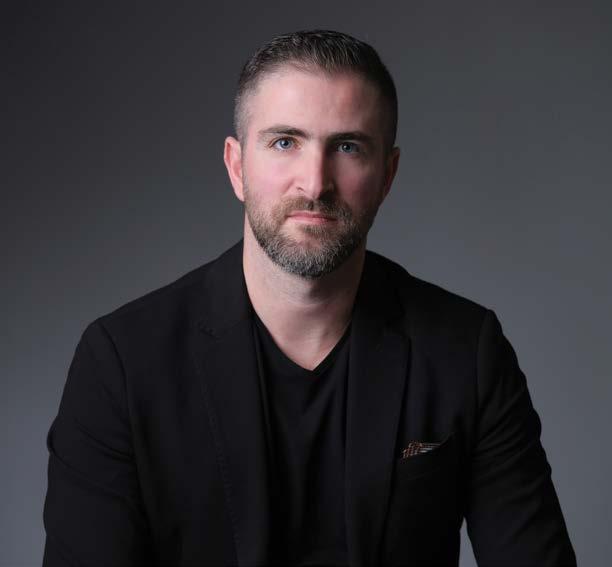
Be the change that you wish to see in the world” is a quote with origins that trace back to 1913. While my origins aren’t nearly as old, I’ve always believed—despite having once viewed our world like Louis Armstrong (as wonderful)—that this quote was more idealistic than realistic. ChatGPT agrees with me—it says: “This quote is flawed, because individual efforts alone are insufficient to address systemic issues that require collective action and structural change.”
}You’ve spent over two decades in the digital and business development space. How has your experience across sales, project management, and technology shaped your approach to leading MontyPay on a global scale?
Over the past two decades, my career in sales, project management, and technology has revolved around one core principle, understanding the market, identifying gaps, and delivering the right digital solutions. In my previous roles, I focused on selling technology and digital solutions across Lebanon and the Middle East. This gave me a deep understanding of how to listen to client needs, analyze the market, and evaluate multiple vendors to choose the best-fit solutions. I learned how to not only introduce a new product but also build its ecosystem, by scaling it to multiple clients and establishing reseller networks that accelerated growth.
}MontyPay has grown into a truly global player, operating in over 50 countries with seven regional offices. What
would you say are the key factors behind the company’s ability to scale so effectively across different markets?
At MontyPay, our global expansion has been built on one clear belief, partnerships drive scalability. From day one, we focused on collaboration rather than competition. Today, we have over 20 strategic partners across the globe: acquirers, PSPs, and technology providers that
tem that connects businesses everywhere. Being part of Monty Holding has also played a key role in our expansion, giving us access to regional teams in the UK, UAE, Saudi Arabia, Jordan, Nigeria, and Indonesia, while keeping our main operational hub in Lebanon.
From this hub, our highly motivated and performing team supports all regional offices, ensuring consistency, agility, and innova-
}2024 was a big year for MontyPay, with the introduction of Smart POS, QCheck, and an end-toend eCommerce service suite. How do these innovations strengthen MontyPay’s position in the competitive payments landscape?
Innovation has always been at the heart of MontyPay’s success, and that’s largely thanks to our in-house development team. Our goal is to
AT MONTYPAY, OUR VISION HAS ALWAYS BEEN TO GO BEYOND JUST PAYMENT PROCESSING. WE AIM TO EMPOWER MERCHANTS WITH A COMPLETE FINANCIAL ECOSYSTEM THAT HELPS THEM GROW, RETAIN CUSTOMERS, AND ACCESS FINANCIAL SUPPORT WHEN NEEDED.”

allow us to support merchants in more than 50 countries.
Our vision has always been global, never limited by geography or product scope. We believe in creating a unified ecosys-
tion across every market. This structure, combined with our partner-first mindset and scalable technology, is what allowed MontyPay to grow so effectively across diverse markets.
consistently deliver the latest payment technologies that make payment collection easy, secure, and fast for our merchants. We’ve built a Smart Merchant Management System that unifies online
and offline payments into a single dashboard, giving merchants real-time visibility, reporting, and analytics. This creates a seamless experience that no traditional provider can match.
The launch of our Smart POS in Lebanon was a strategic milestone, helping digitize a market that’s still heavily cashbased and paving the way toward a cashless future. Meanwhile, QCheck, our self-service payment solution for restaurants and hotels, revolutionizes how customers pay fast, contactless, and convenient.
Beyond payments, we wanted to support businesses end-to-end. That’s why we launched our eCommerce service suite, helping merchants build their online stores at low cost, integrate payments effortlessly, and expand globally.
Together, these innovations strengthen MontyPay’s position as a comprehensive, next-generation fintech, bridging the gap between digital payments, technology, and business growth.
}Your platform integrates multiple services—from payment processing to loyalty programs and lending. How does this unified ecosystem give MontyPay a strategic edge over traditional payment service providers?
At MontyPay, our vision has always been to go beyond just payment processing. we aim to empower merchants with a
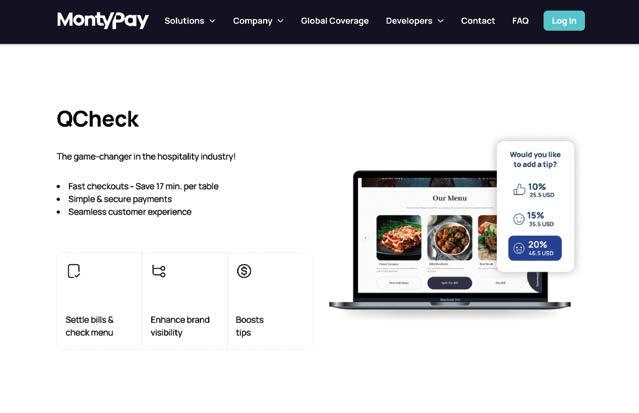
INNOVATION HAS ALWAYS BEEN AT THE HEART OF MONTYPAY’S SUCCESS, AND THAT’S LARGELY THANKS TO OUR IN-HOUSE DEVELOPMENT TEAM. OUR GOAL IS TO CONSISTENTLY DELIVER THE LATEST PAYMENT TECHNOLOGIES THAT MAKE PAYMENT COLLECTION EASY, SECURE, AND FAST FOR OUR
MERCHANTS.”
complete financial ecosystem that helps them grow, retain customers, and access financial support when needed.
To differentiate ourselves from traditional payment providers, we focus on value creation. One example is our partnership with ZEAL, the leading POS loyalty platform. Through this integration, our merchants can now use their POS terminals not just to collect payments, but also to reward customers, increase repeat business, and boost sales, turning every transaction into an opportunity for loyalty.
In parallel, we’ve developed a credit scoring
engine that analyzes merchant transactions, payment history, and business performance. Through our partnership with Monty Finance in Lebanon, this enables us to offer SME loans to eligible merchants directly from our ecosystem. This lending model will serve as our pilot before expanding globally through new financial partners.
By combining payments, loyalty, and lending under one unified platform, MontyPay is building a fintech ecosystem that truly supports merchants end-to-end helping them collect, grow, and scale their businesses effortlessly.
}In 2025, MontyPay expanded into Saudi Arabia with a new office in Riyadh. What were the main motivations behind this move, and how does it align with the Kingdom’s evolving fintech and digital transformation agenda?
Saudi Arabia is one of the fastest-growing digital payment markets in the world, driven by a strong national vision to build a cashless, innovationdriven economy. For us, it was not a question of if we should enter Saudi Arabia, but when. Expanding into Riyadh was a strategic and natural step for MontyPay. The Kingdom’s Fintech and Vision 2030
agenda perfectly aligns with our mission to empower businesses through cutting-edge payment solutions. We see massive potential to contribute to this transformation by offering advanced payment technology, global expertise, and a strong local presence. While competition in Saudi Arabia is high, we believe that it’s never too late to add real value. Our approach is built on experience, innovation, and passion, and we are confident that MontyPay can play a meaningful role in supporting the Kingdom’s shift toward a fully digital and cashless economy.
}Saudi Arabia’s payment ecosystem is developing rapidly under Vision 2030. How is MontyPay localizing its products and partnerships to serve the specific needs of Saudi businesses and consumers?
MontyPay is fully committed to supporting Saudi Arabia’s Vision 2030 by tailoring our solutions to the unique needs of the local market. We’re localizing our products to ensure full compliance with local regulations and seamless integration with the Kingdom’s financial infrastructure. This includes supporting local payment methods, offering Arabic-language interfaces, and ensuring compatibility with local banks and digital wallets. On the partnership front,
we’re actively collaborating with local fintech players, system integrators, and business communities to better understand the evolving needs of Saudi merchants and consumers. Our goal is to be more than just a payment provider. We want to be a trusted technology partner contributing to the Kingdom’s digital economy.
}Customer experience is at the heart of MontyPay’s omnichannel approach. Can you elaborate on how this model enhances both merchant and consumer satisfaction across your markets?
MontyPay’s omnichannel approach is designed to create seamless and consistent experiences for both merchants and consumers across all touchpoints. For merchants, it means having a unified platform that integrates online & in-store payments, loyalty programs, and customer insights in unified platform. This empowers them to operate more efficiently and make data-driven decisions that drive growth. For consumers, it ensures a smooth, convenient, and personalized shopping experience whether they engage through mobile, web, or in person. By bridging these channels, we help merchants build stronger customer relationships, increase their revenues, and satisfaction on both ends.
}MontyPay recently launched a point-based loyalty program in Lebanon. What insights have you gained from that initiative, and do you plan to replicate it in other regions such as Saudi Arabia or the UAE?
Lebanon has always been our innovation lab, a market where we can launch, test, and refine new solutions before scaling them globally. The recent launch of our loyalty program is a great example. We wanted to observe how merchants and consumers interact with such a feature in a real environment,
gather feedback, and optimize the experience.
Once a product proves successful in Lebanon, we move quickly to replicate and localize it in larger markets like Saudi Arabia, the UAE, and beyond. This strategy allows us to innovate efficiently while ensuring that every solution we deploy internationally is tested, validated, and ready to scale.
}As General Manager, you lead teams spread across continents. What leadership principles guide you in maintaining cohesion, innovation, and motivation across such a diverse and fast-moving organization?
Leading a global team requires clarity, trust, and empowerment. For me, it all starts with choosing the right people, individuals who not only have the skills but also share the same passion and values as MontyPay. Once you have the right team, the next step is to set a clear vision and measurable objectives, so everyone understands how their work contributes to the bigger picture.
I believe in empowering people, giving them ownership over their tasks, and trusting them to deliver. My role is to guide, support, and remove obstacles, not to micromanage. I also put a strong focus on continuous training and open communication, ensuring that every team member feels part of the global journey, no matter where they are.
At MontyPay, we operate across continents, but we stay united through shared goals, mutual respect, and a culture of innovation, that’s how we keep growing together as one team.
}Finally, looking ahead, how do you envision MontyPay’s role in shaping the future of digital payments in the MENA region and beyond — and what can we expect next from the company under your leadership? Our vision at MontyPay is to redefine
how businesses collect payments, to make it simpler, faster, and more connected than ever before. We’re building a truly borderless payment ecosystem, one where merchants, whether small startups or large enterprises, can accept any payment method, in any country, through one unified platform.
Our goal is to empower thousands of merchants globally to grow their businesses, and we’ll continue focusing on innovation, reliability, and inclusion. In the MENA region, our mission is to help accelerate the shift toward a cashless economy, bringing together banks, fintechs, and merchants under one ecosystem.
We’ll keep enhancing our omnichannel platform, expanding our payment orchestration, and introducing AI-driven analytics, loyalty, and lending solutions to help our merchants not only collect payments, but also grow smarter and faster.
At MontyPay, we see payments not as a transaction, but as a connection between businesses and their customers, and our job is to make that connection effortless across every channel and every market.

Wissam Younane is a prominent media executive and entrepreneur based in Dubai, United Arab Emirates. He is the founder and CEO of BNC Publishing, the company behind Entrepreneur Middle East, a leading business media platform in the MENA region. Under his leadership, BNC Publishing has become a key player in the regional media landscape, producing content that supports and celebrates entrepreneurship and innovation.
Younane has built a reputation for curating high-profile events that convene some of the most influential figures from across industries and public life, including former UK Prime Minister Boris Johnson, and many others.
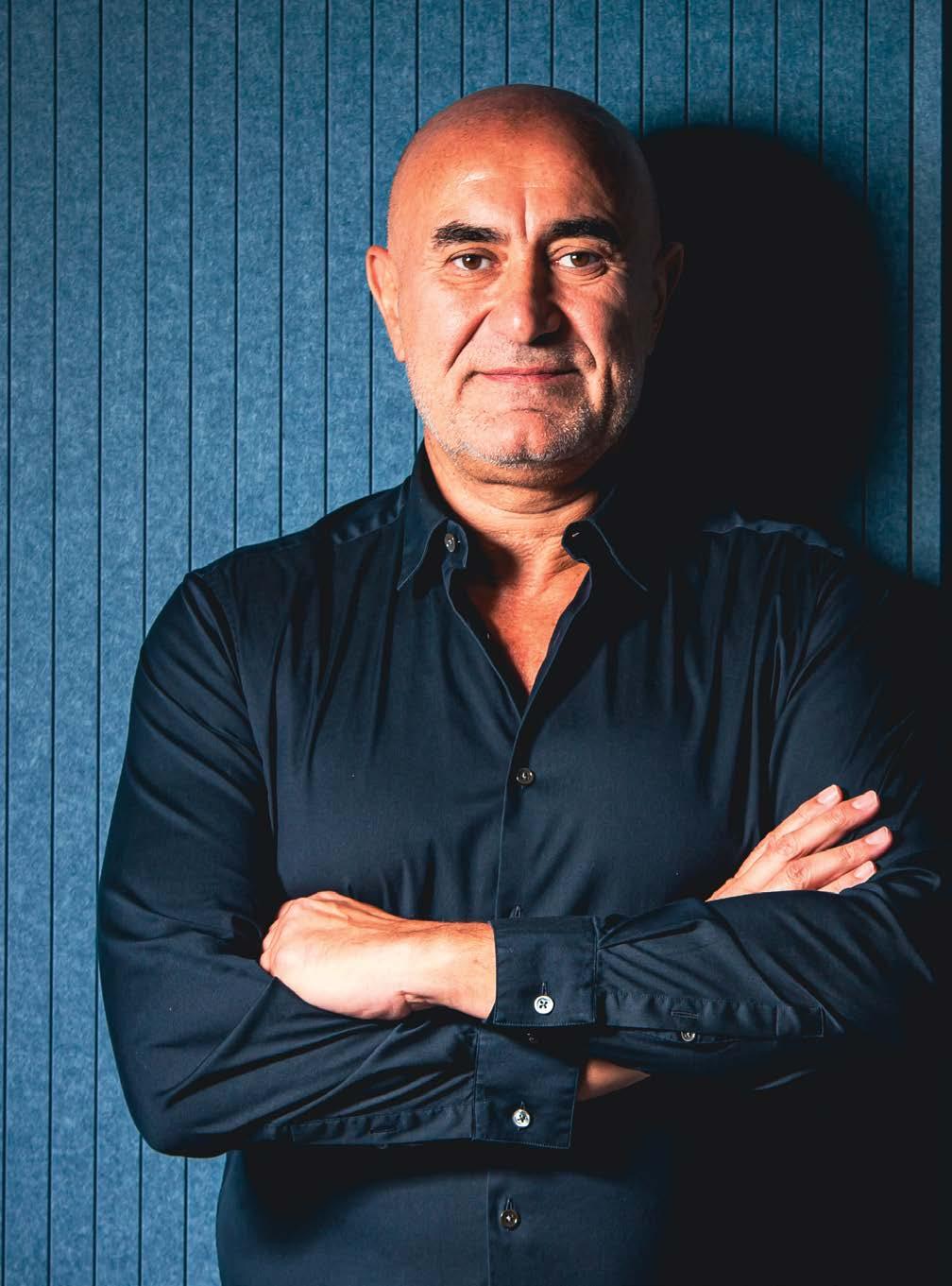

Amazon Vice President, Middle East, Africa, and Türkiye Ronaldo
on launching Amazon Now and redefining convenience across the region.
by TAMARA PUPIC
Ronaldo Mouchawar once taught aspiring e-commerce entrepreneurs in the Middle East how to wait — for infrastructure to catch up, for payments to move online, and for consumers’ trust to be earned one delivery at a time. Now, he is teaching them how not to.
With the launch of Amazon Now, the first quick commerce service of its kind from Amazon globally, Mouchawar is redefining convenience in a region that has fostered innovation and created the optimal environment for experimentation and growth.
“Initially, when we started doing e-commerce in the region, it was something very new,” Mouchawar explains. “We had to, kind of, pave the way on our own to build these services — we were the innovators. We also had to focus on the early adopters, speaking to smaller businesses about how to come online and start selling. Today, I’d say we’re in the next phase — it’s all about localizing a global service like Amazon.”
The newly-launched Amazon Now is the company’s fastest delivery service to date aimed at delivering everyday essentials to customers in 15 minutes. “Since 2019, when Amazon started operating in the UAE and across the region, we’ve added a wide selection of products, and today customers visit our website for their everyday needs. So, we’ve seen them come back daily to buy whatever they need from the vast range we offer,”
Mouchawar says. “Over time, we realized that there are certain products customers want to receive much faster. So, by listening to them, understanding trends, and leveraging technology, we’re now launching this new service - Amazon Now.”
Amazon has introduced two services — a 15-minute delivery for everyday essentials for customers across most major areas in the UAE, and a 2-hour delivery option offering an even wider selection of products across more than 30 categories. It plans to expand to even more locations in the coming months. “Firstly, microfulfillment centers located within communities deliver orders in just 10 to 15 minutes — groceries, frozen items, and other everyday essentials,” Mouchawar explains. “We also offer a 2-hour service that delivers a broader selection — clothing, electronics, and home
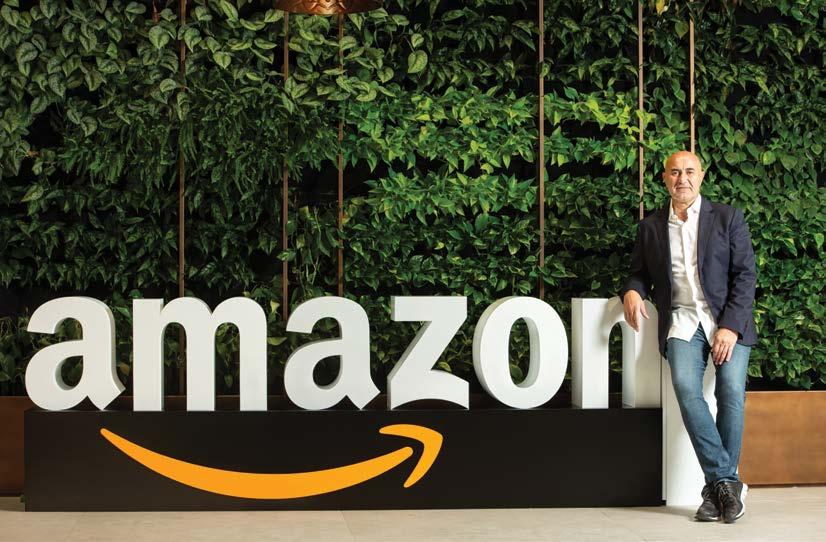
CUSTOMERS HERE REALLY VALUE SPEED AND CONVENIENCE. WHEN WE FIRST STARTED, AMAZON OFFERED ONE-DAY DELIVERY. THEN WE INTRODUCED SAME-DAY, FOLLOWED BY TWO-HOUR DELIVERY — AND NOW, 15 MINUTES.”
products. It’s a hybrid network — a very fast, quick commerce model that serves many of our Prime customers in major cities, while the two-hour service supports customers everywhere.”
This ultra-fast delivery reinforces Amazon’s commitment to meet the evolving needs of UAE customers. “Customers here really value speed and convenience,” Mouchawar says. “When we first started, Amazon offered one-day delivery. Then we introduced same-day, followed by two-hour delivery — and now, 15 minutes. And we’re doing it across a very large selection of products.”
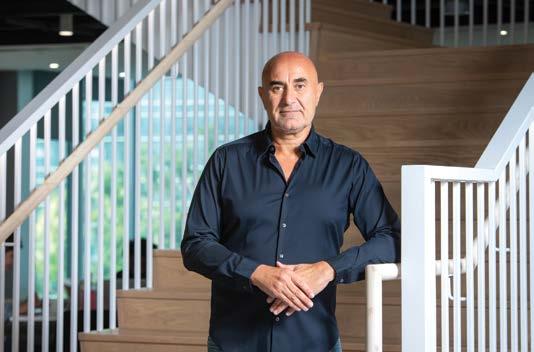
“Customers also want an easy way to shop through the app and add multiple items quickly, so we’ve launched a dedicated interface for Amazon Now that’s very simple to navigate — almost like walking through the aisles of a grocery store. Because the service is fast, we’ve also built in notifications and tracking, so customers can see their orders coming in real time. The store is available 24/7, so deliveries can happen at any time.”
Mouchawar adds, “And finally, customers have the flexibility to pay using debit cards, credit cards, or whatever payment method they prefer in the region. The idea is to deliver greater convenience — ensuring customers turn to us not only for same-day products, which already number in the hundreds of millions, but also for their everyday groceries and essentials.”
Even as Amazon Now promises delivery in as little as 15 minutes, Mouchawar is quick to emphasize that speed never comes at the expense of safety. The company’s delivery teams, he notes, undergo rigorous training, and performance is measured by reliability — not by how fast they drive. “We take safety very seriously,” he says. “Our drivers and fleet associates go through a very rigorous training in terms of how to drive safely. There aren’t KPIs for delivering fast.The speed comes from shorter routes and technology, not from drivers going faster.”
Behind Amazon Now’s promise of near-instant delivery lies a sophisticated layer of artificial intelligence — one that balances precision with safety. As
Mouchawar explains, AI isn’t just powering speed; it’s orchestrating every step of the process to protect both customers and drivers. “AI helps us predict what products to place in which community, so we look at different neighborhood shops and tailor the selection and assortment accordingly,” Mouchawar says. We also use AI to ensure that our supply chain replenishment and service frequency operate at a much higher level of efficiency — with multiple replenishment cycles per day. AI also helps us to determine optimal product placement across these locations.”
He adds, “And finally, we use AI to predict and fulfill delivery promises. So, if we say 12 minutes, 8 minutes, or 10 minutes — our fastest delivery so far has been just 6 minutes — we make sure it’s achieved safely. That means allowing enough time to pack the order and compute the route in a way that ensures the driver can deliver within the allocated time, without compromising safety.”
Mouchawar has long been known for relying on partnerships and inclusion as a means of driving sustainable growth. That same philosophy endures with the launch of Amazon Now. “For example, we’re partnering with 7X [the new identity of Emirates Post Group] because they already operate within different communities,” he says. “We’re doing the same with petrol stations like ENOC and large grocery groups like Lulu here in the UAE, and Al-Othaim in Saudi Arabia, which is a major grocer. They know their
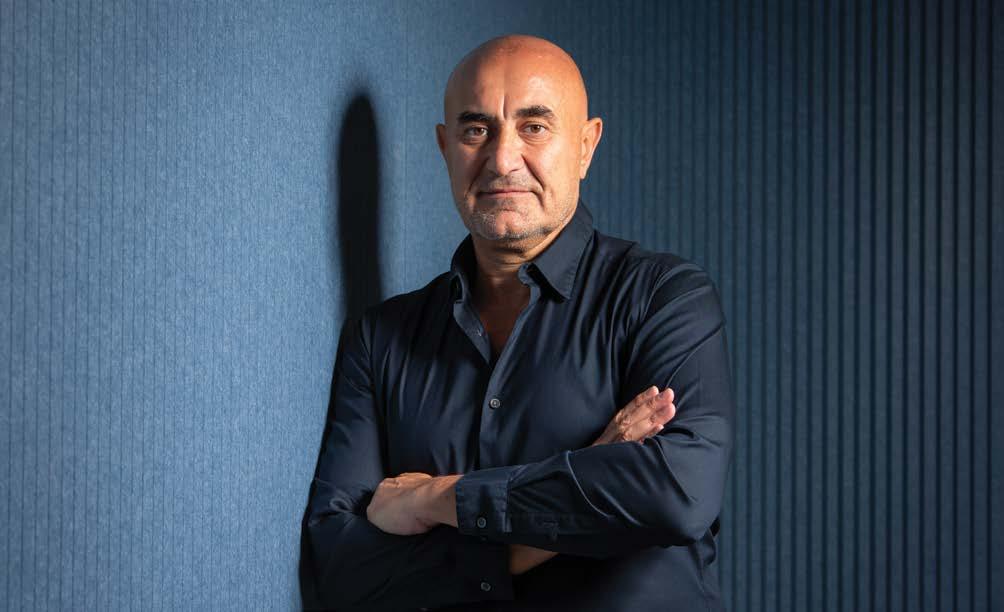
“ business best — how to manage their grocery supply, how to provide quality service — while we focus on the technology side: making their products more accessible, helping them grow their customer base, and ensuring that users on our app benefit from the latest technology and the convenience our logistics network provides.”
With a steady stream of major announcements from Amazon Middle East, Africa, and Türkiye under his leadership, it’s easy to forget that Mouchawar is also marking two decades since he first changed the region’s digital landscape. Twenty years after founding Souq.com, he continues to shape how the Middle East shops, innovates, and connects through technology. “I’ve been blessed to be in this region,” he says. “We’ve seen a huge shift in how customers consume content and services — starting from the early days of Arabic content with the Arabic online portal Maktoob, to the rise of digital services driven by mobile phones. Today, with the advancement of quick commerce, customers across the region are fully accustomed to instant delivery, just as they are to regular e-commerce. It all comes from being constantly connected through their phones, with localized services that customers truly love.”
As Mouchawar looks ahead, he sees the next frontier - AI - already taking shape. “We’re going through what feels like the fourth revolution in digital technology. If you think about it — first came the internet and networks, then computers and laptops, followed by the mobile phone,” he says. “Now, with AI, we’re experiencing another major transformation. It’s a technology that’s changing the way we work, making life more convenient and improving the experience for our customers.”
Customers also want an easy way to shop through the app and add multiple items quickly, so we’ve launched a dedicated interface for Amazon Now that’s very simple to navigate — almost like walking through the aisles of a grocery store.”
In many ways, Amazon’s evolution mirrors that of the region itself: both are leaning into artificial intelligence as the next great catalyst for innovation and efficiency. “We have different teams at Amazon that are expanding their presence in the region- our cloud-based virtual assistant Amazon Alexa is here; we have our video business with Prime Video, as well as the smart home security devices
OUR DRIVERS AND FLEET ASSOCIATES GO THROUGH A VERY RIGOROUS TRAINING IN TERMS OF HOW TO DRIVE SAFELY. THERE AREN’T KPIS FOR DELIVERING FAST.THE SPEED COMES FROM SHORTER ROUTES AND TECHNOLOGY, NOT FROM DRIVERS GOING FASTER.”
Amazon Ring. Amazon Web Services (AWS) now operates multiple data centers across the region — in the UAE and Bahrain — and we’re preparing to launch in Saudi Arabia,” Mouchawar explains. “We’re also partnering with strong regional AI initiatives, such as Humain in Saudi Arabia. The region has truly embraced AI, with significant investments being made in this space. We want to be early adopters, to stay at the forefront, and to have a real stake in this technology. There’s a lot happening in the region, and we’re excited to be part of that momentum.”
Across the region, startups and entrepreneurs continue to look to Mouchawar and Amazon as both an inspiration and a potential partner — aspiring to one day supply their innovations, technologies, or products through its vast network. Mouchawar’s advice to them is simple: stay customer-obsessed. “I would say always focus on your customer — make sure you understand the space you’re in, do it well, do it at scale, and use technology. That way, the chances of your service succeeding and complementing what Amazon offers in the region and globally become much higher,” he explains. “We’re very customer-
obsessed. We love entrepreneurs who build, who focus on their customers, and who scale their services. We’ve partnered with many in the region — in areas like after-sales and payments. Just this month, I was looking at our data, and more than ten of our sellers are now generating over a million dollars in sales in the region. We’re seeing these smaller, regional entrepreneurs grow — using Amazon’s technology not only to sell locally, but to expand their reach beyond the region as well.”
When Mouchawar was starting out, the region’s entrepreneurial landscape was defined by scarcity — of infrastructure, of investors, and sometimes even of belief. Today, it’s defined by ambition and scale. “Just to reflect on that — when we started Souq [the e-commerce platform founded by Mouchawar in 2005 that was acquired by Amazon in 2017], Maktoob, and a few of the other early ventures in the digital space, it was mainly the private sector driving investment. We had to travel abroad to raise capital from multiple VCs around the world,” he says. “Today, we’re very fortunate that the region has completely transformed. We now have sovereign funds, fund-offunds, and governments
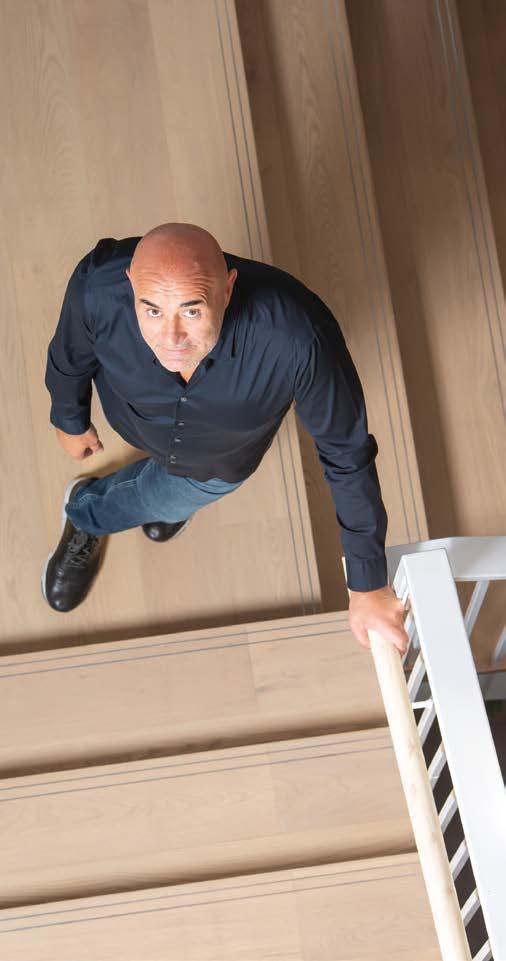
playing a major role in enabling entrepreneurs and advancing digital services. For entrepreneurs today, instead of having to go overseas and educate investors and banks about the region, there’s now strong access to capital and resources right here at home.”
Looking back at that evolution, Mouchawar offers a perspective only a true pioneer can — and advice for entrepreneurs on where to focus their energy next.
“The key is to focus on solving the really big problems that still exist — and there are plenty across different sectors, whether in health, education, fintech, or e-commerce,” he says.
“We continue to see opportunities in transportation and other major industries that are ready — or already in the process — to be disrupted by technology.
“I think the focus should always be on building services for the region, using technology at scale, and, above all, focusing on your customer. Make sure customers love what you offer. Keep it simple, keep it scalable, and stay consistent in how you apply technology.”
In the end, Mouchawar says the most valuable lesson he has learned over the last 20 years in entrepreneurship isn’t about technology or scale — it’s something more personal: perseverance. “You have to adapt, but you also have to be very stubborn about your mission,” he concludes. “I’ve seen that throughout my
journey — from the early days of Souq to the transition from Souq to Amazon, which wasn’t easy at all because we had to bring two companies together. But in doing so, we combined Amazon’s global resources and expertise with everything we had built locally — our logistics, transportation, payments, and delivery networks. The result is a deeply localized service, and we continue to build on that foundation every day.”
“I think the focus should always be on building services for the region, using technology at scale, and, above all, focusing on your customer. Make sure customers love what you offer. ”

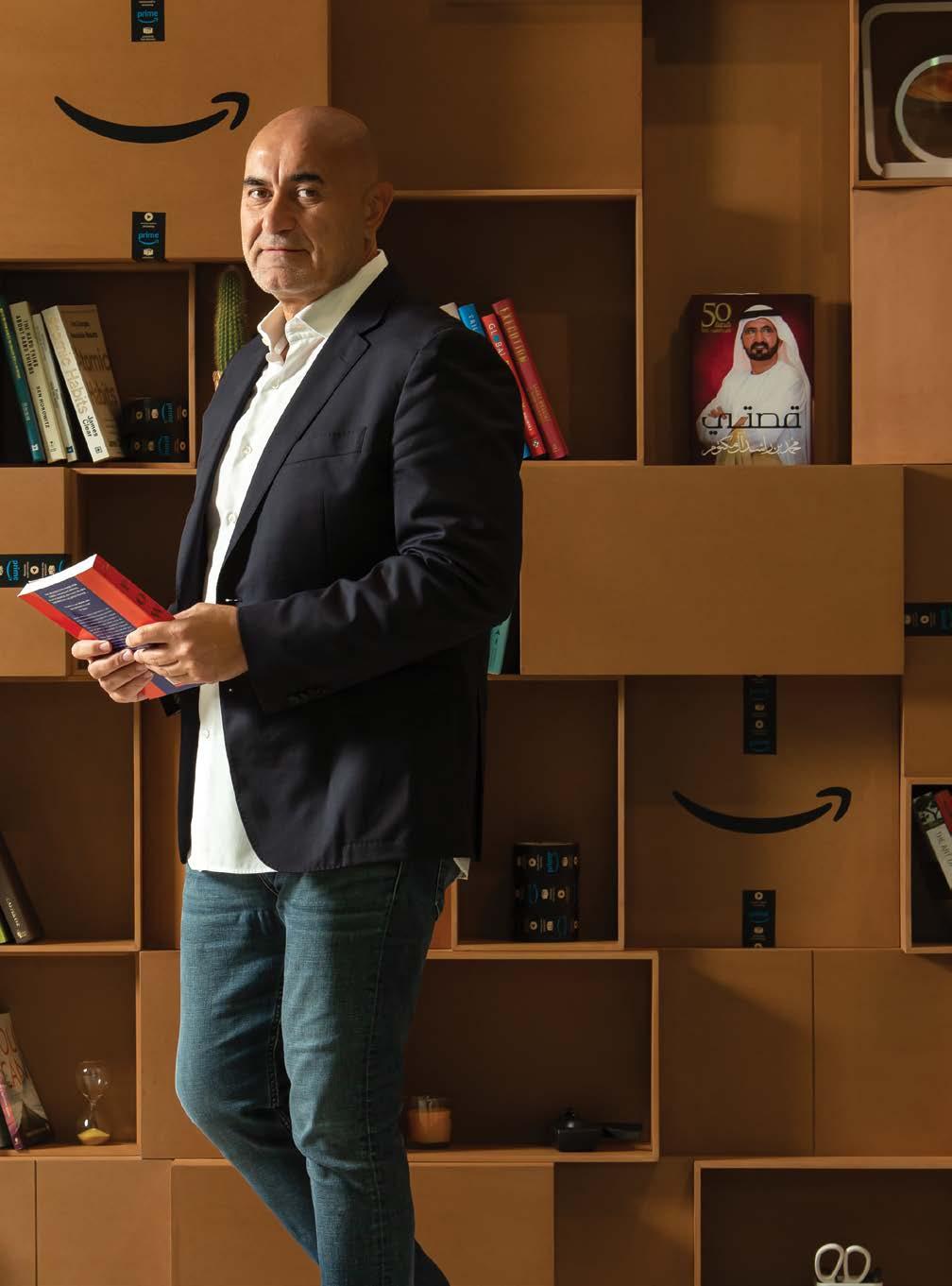
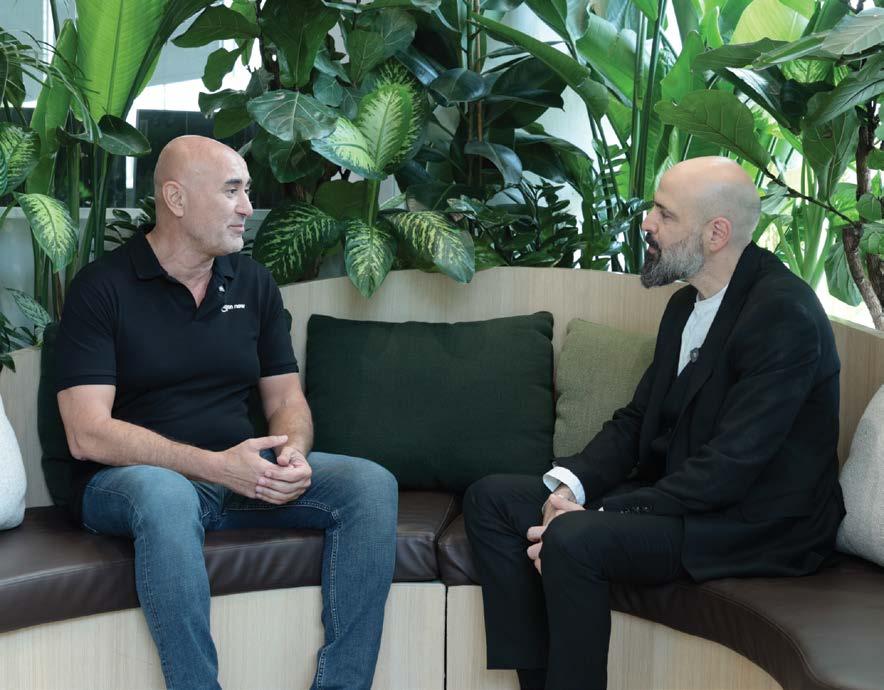
Ronaldo Mouchawar and Wissam Younane Inspire Bold Beginnings
WHEN ENTREPRENEUR MIDDLE EAST’S WISSAM YOUNANE SAT DOWN WITH RONALDO MOUCHAWAR, THE CONVERSATION WENT BEYOND E-COMMERCE AND INNOVATION — IT WAS ABOUT COURAGE, PERSEVERANCE, AND THE PURSUIT OF PURPOSE.
} Wissam Younane: I’m from Lebanon, and you’re from Syria. Today, we both live in the UAE — in Dubai, one of the most vibrant and opportunity-filled cities in the world. How would you encourage Arab dreamers like us who left our home countries at a young age in search of a better future?
Ronaldo Mouchawar: I always start with the word yalla, get going. The hardest thing is the first step, to decide to chase your dreams and get on the journey. That decision usually requires some courage.
But not doing it, not chasing your dream, is probably a lot worse than trying it, even if it fails.
There is a lot happening in the region. I started my journey by focusing on the internet, Arabic, and then commerce online, and all three have always panned out for us. Today, there are a lot of sectors you can go into and disrupt with technology. So just, yalla.
} Wissam Younane: What would you advise entrepreneurs like us in the UAE to focus on going forward?
Ronaldo Mouchawar: Embrace AI — understand its impact and how you can use it to serve your customers and enhance their experience. Today, that’s almost a necessity for anyone developing technology.
But beyond that, surround yourself with a strong team. I’ve always made sure to work with people who complement my skills. I’m not great at finance, so I have a really good finance person. I wasn’t the best programmer — I thought I was, until I met someone who was much better. It’s all about surrounding yourself with like-minded people who bring different strengths to the table.

Having pioneered the UAE’s media industry for nearly two decades now, Ti22 Films and Dubai On Demand founder Reim El Houni is on a mission to help founders and business leaders position their brands better through leveraging the power of visual media.
by AALIA MEHREEN AHMED

Enthralled by the world of media and entertainment from a very young age, Reim El Houni soon realized that her true calling lay in the same space as well, when, at just 16, she became a store manager at a video rental shop in the UK. “I loved that job because I could watch as many films as I wanted and, off the back of that experience, I tried to find opportunities in the industry,” she recalls. “My first internship was that same year at the Middle East Broadcasting Center (MBC), when they were still based in London. That experience for me was what made me realize that as much as I love watching content and consuming it, I could actually now create it too. That was also the first time I stepped into a TV studio and I saw the behind the scenes and…I was obsessed! From that moment on it was like a switch—I knew this is what I wanted to be doing for the rest of my life.”
A couple of decades since then, El Houni today has two UAE-homegrown media production companies that she has built from the ground up: Ti22 Films, a Dubai-based production studio delivering high-impact corporate films, branded content, and storytelling; and Dubai ON Demand, a content-creation platform and media network empowering entrepreneurs and industry leaders to build their personal brand through strategic video storytelling.
ON DEMAND WAS BORN IN 2014. NOW THAT HAPPENED MAINLY BECAUSE I LOVE LEARNING, AND I USED TO TRAVEL (AND STILL TRAVEL) TO CONFERENCES AND CONVENTIONS ALL OVER THE WORLD. AND I KEPT HEARING ABOUT THE GROWTH OF DIGITAL CONTENT, YOUTUBE, AND EVERYTHING ELSE, AND
I WOULD COME BACK HERE AND NOT SEE THAT GROWTH YET.”
But allow me to turn back the clock back to when El Houni was still a teenager in the United Kingdom. Her perseverance following that initial epiphany landed her a job at the British Broadcasting Corporation (BBC) —more specifically BBC Education— while she was still a university student. “I was at university two days a week and at the BBC studios three days a week, which was amazing because within a year my name was in the credits,” El Houni recalls. “That was a great launch pad for this industry and I learned so much about working at a TV station and what it takes to put a show together. However, it’s very difficult to get full-time work in the world of television because it’s very contract-based. So I ultimately ended up joining a corporate video production company and I grew that in the UK for a while.”
After six years of working in the UK’s media industry, El Houni, upon the request of a friend, made a casual trip to the UAE for a break. “I came to Dubai on a holiday 18 and a half years ago and my first reaction was ‘Oh my god it’s sunny!”; my second was ‘Oh there’s a whole media city here!’” she tells me. “So I went straight to Dubai Media City, and bought a guidebook. And I remem-
ber sitting in a coffee shop with that guidebook and contacting all the companies in it. In my one week holiday, I had five interviews, three job offers, and had signed a contract–that’s what moved me to Dubai. I was very fortunate. I was a second employee at Dubai One, so I produced and directed their first English language TV show which was called Out and About.”
“Do you remember it by any chance?” El Houni asks me when her narration about Dubai One elicits a fervent nod from me. Indeed, I –like many others who’d been in the UAE at the time– remember how the channel replaced the long-running cable station Channel 33. Since that shift in 2004, Dubai One has remained a pivotal English-speaking media platform in the nation– and El Houni has been a key figure in its growth journey, having been a producer and presenter for the channel. At the time that this interview took place, at the Ti22 Films headquarters in Dubai, El Houni was also on the brink of launching the ninth season of DXB Today, a daily English-language lifestyle and culture show that airs on Dubai One, of which she has been the Executive Producer. “But thinking back to that time, in 2007, that show [Out and About] was an amazing
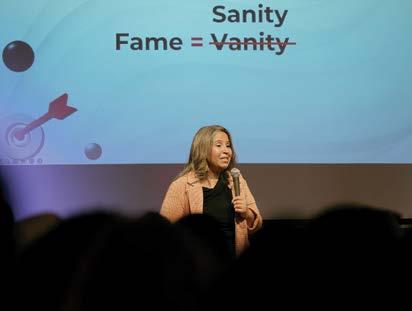
project because I was new to the city, but I was also producing a show that showed people what to do in Dubai– so I was literally being introduced to the city through that show,” she recalls. “I was with the station for almost four years. I became an executive producer and managed a whole bunch of other shows ahead of major events. For example, I covered the film festival at the time, the opening of Burj Khalifa, the air show– all of these big events!”
Quite nonchalantly, El Houni adds, “Oh, I also ended up working on Mission Impossible: Ghost Protocol during that time period…that’s a whole other long story which I’ll skip, but working on that gave me added confidence. Because, you know, I had been working in TV up until that point where you get used to a crew of 40-50 people, and now I was on a
Hollywood movie set with 400-500 people. But I realized that, actually, it’s exactly the same; it’s just a matter of scale. So I came out of that experience feeling really confident and feeling like I could do this too, you know? At the same time, I’d also worked on a couple of side projects for breast cancer awareness and I entered them to the New York Film Festival where they won two golds and two silvers. So that was another boost.”
With this context in place, it becomes easier to see how El Houni has been instrumental in shaping the UAE’s media landscape. But as it often happens with entrepreneurs and pioneers, El Houni began to feel the effects of doing too much all at once. “It just got to a point where I was tired because in our industry you do work crazy hours –through the night and early mornings– and I just
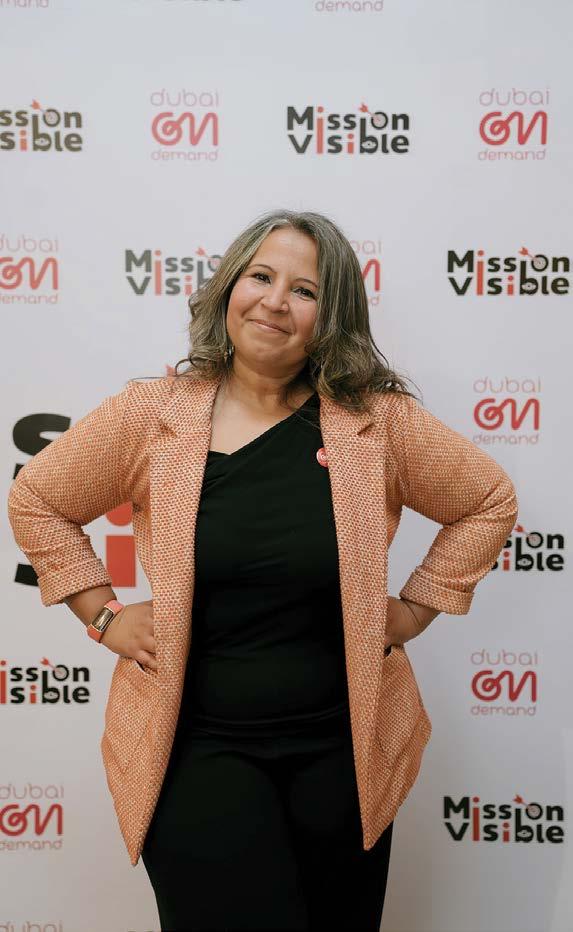
felt like I needed to stop,” she says. “Everyone under the sun told me not to, but that decision ultimately led me to launching Ti22 Films in January 2011.”
Ti22 Films was thus launched as a platform that allowed corporate
brands to become more accessible to their current and potential clients through visually appealing corporate videos, commercials and video marketing content. “My first client was ENOC [the Emirates National Oil Company, a global oil and gas player established wholly owned by the
Government of Dubai], which was amazing,” El Houni shares. “So within a very short period of time, we were building a proper government portfolio, and then only three years later, Dubai On Demand was born in 2014. Now that happened mainly because I love learning, and I used to travel (and still travel) to conferences and conventions all over the world. And I kept hearing about the growth of digital content, YouTube, and everything else, and I would come back here and not see that growth yet. It was very different from Ti22 Films, where we do high-end projects and big TV shows. Dubai On Demand was more about tapping into YouTube, the personal-branding space, and niche content — and it was more accessible and B2C-driven.”
But while Ti22 Films had a good start, Dubai On Demand “in all honesty, failed initially,” reveals El Houni. “We spent two years really pushing it and promoting it; but I don’t think the market here was ready at that time,” she says. “Which is fascinating now, because everywhere you go everyone’s talking about YouTube series, and I’m like, I was saying this 10 years ago! But I kept revisiting the idea. Then in 2018, when influencer licenses were introduced, I thought, ‘maybe now’s the right time to start again.’
Eventually it was in 2020 that we kicked it off properly, and that’s how Dubai ON Demand has evolved into what it is today, where we work with a lot of thought leaders and individuals to help them grow their visibility. Sometimes it’s through a YouTube series, sometimes it’s a podcast — different mediums. That led to us launching a community last year called Mission Visible, because I’m very passionate about everyone getting in front of a camera and claiming their visibility. I truly believe anyone can do this.”
Indeed, with the bombastic growth of social media, and the influencer culture that has come with it, the concept of a “personal brand” has evolved into a value-driven ideology–
and according to El Houni, tapping into this space could unlock hidden potential for business leaders and executives (and, in turn, their brands). “I think we’re definitely in a world where it’s no longer a nice-to-have but a must-have– but this isn’t just my opinion; there are so many studies and statistics that support this notion,” El Houni explains. “Recently I read that around 66% of people are more likely to do business with a company if they’ve watched a video of the CEO, and I think it’s 73% who are more likely to do business with a company if they follow the CEO on social media. To me, those are very high numbers. So even when I’m working with someone and they say, “Oh, do I really need to be in the video?” — no, you don’t need to be in the video, but there’s a 66% higher chance someone’s going to work with you if you are. Sometimes it’s just logic. These are odds you can’t ignore. This is the market right now.”
RECENTLY I READ THAT AROUND 66% OF PEOPLE ARE MORE LIKELY TO DO BUSINESS WITH A COMPANY IF THEY’VE WATCHED A VIDEO OF THE CEO, AND I THINK IT’S 73% WHO ARE MORE LIKELY TO DO BUSINESS WITH A COMPANY IF THEY FOLLOW THE CEO ON SOCIAL MEDIA. TO ME, THOSE ARE VERY HIGH NUMBERS. SO EVEN WHEN I’M WORKING WITH SOMEONE AND THEY SAY, “OH, DO I REALLY NEED TO BE IN THE VIDEO?” — NO, YOU DON’T NEED TO BE IN THE VIDEO, BUT THERE’S A 66% HIGHER CHANCE SOMEONE’S GOING TO WORK WITH YOU IF YOU ARE.”
But all of this isn’t to say that El Houni isn’t empathetic towards individuals who are camera-shy or simply do not wish to be in the public eye. After all, the idea that “if you’re not visible, you’re invisible” — the tagline that underscores Dubai On Demand’s aforementioned show Mission Visible— was
something that took El Houni herself a long time to accept. “Ten years ago, I wouldn’t have put myself out anywhere,” she says. “I grew up an Arab, female, Muslim, with my mom telling me it’s inappropriate to put yourself out there; that anyone in entertainment is inappropriate. That’s what I grew up with.
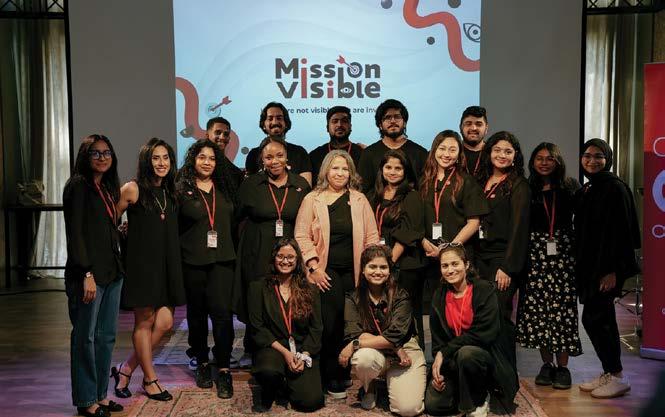
So I’ve had to overcome those cultural limiting beliefs to put myself out there. And because I’ve been able to do it, when I talk to other CEOs who have cultural objections, I’m able to say, “Times have changed. Look at how many Arab, female, religious women are out there now.” So I think part of it is logic, and part of it is seeing examples of people in similar spaces. I have a lot of case studies of people where I can show them: look at how this person did it, look at how that person did it — and usually they’re names they respect, who have succeeded in the business space. When they can relate to it, that helps.”
To help ease businesspeople into becoming more comfortable with being in front of the camera, Dubai ON Demand also runs plenty of bootcamps, El Houni
THE POINT OF CREATING ANY VIDEO CONTENT IS TO RAISE AWARENESS AND ATTRACT PEOPLE. YOU ATTRACT THEM FIRST, AND THEN THEY CAN GO TO YOUR WEBSITE, CALL YOU, AND FIND ALL THE INFORMATION THEY WANT. SO WHEN IT COMES TO WORKING WITH BRANDS, WHAT WE’VE DONE SUCCESSFULLY IS EXTRACT: WHY SHOULD AN AUDIENCE CARE ABOUT THIS? HOW DO WE TAP INTO THAT EMOTIONALLY? HOW DO WE TELL A STORY THEY WILL RELATE TO?”
reveals. “I truly believe in immersion,” she says. “I feel you need to push people out of their comfort zone, and then they realize, “Oh, it’s not that bad after all.” You need to get them to show up and film all day long so they reach that point of, ‘That wasn’t so bad, I can do this again.’ So a bit of “bullying” [laughs] works — along with logic and case studies, of course!”
Concurrently, El Houni continues helping brands and businesses reach wider audiences through the work done at Ti22 Films. “These brands have spent a lot of time refining their key messaging and their objectives but often they don’t connect that to an audience,” El Houni explains. “The issue is that they don’t tap into the storytelling side, the emotional side, or ask: ‘why does this matter to the average person?’ And I think that’s the gap. I see it time and time again. For example, when we’re doing a corporate video, the organization will want to fit every key message known to man into that video. But I’m like, this is not a shopping list! The point of creating any video content is to raise awareness and attract people. You attract them first, and then they can go
→ Dubai On Demand is a lifestyle-driven online video network showcasing authentic voices and original content from the UAE. It is a creator-led platform helping entrepreneurs, experts, and influencers build their on-camera presence.

to your website, call you, and find all the information they want. So when it comes to working with brands, what we’ve done successfully is extract: why should an audience care about this? How do we tap into that emotionally? How do we tell a story they will relate to? And because we’ve worked with so many industrial brands in particular, we’ve gotten very good at it.”
In a real-time demonstration of her craft, El Houni offers me an example. “If I’m talking to you about a steel company or an oil company or a pipe manufacturer, that’s not something the average person necessarily gets excited about,” she says. “But when you start telling the story that steel is in everything — your laptop,
your watch, the wheels on your car — suddenly you’re thinking about steel differently. You realize it’s not just about factories and pipes; it’s enabling your life. And if you can find that connection between the brand and the end customer, that’s when you have a winning formula.”
Part of El Houni’s mission to help business leaders become more visible, and brands feel more accessible, is incorporated into the many large-scale events she and her team cover. Perhaps the biggest such opportunity came her way on October 1, 2020, when Ti22 Films was roped in to do a daily show at the Expo 2020 Dubai–an experience that resulted in 182 consecutive live shows and, as per a recent
Instagram post by El Houni, “a project that changed the meaning of a date forever.” But before she answers what that experience meant to her, El Houni offers an anecdote from her early media days in Dubai— January 2010 during the Burj Khalifa’s launch event, to be more precise.
“I often talk about this in a keynote, because in my perspective everything changed then. I did two live shows that day for the opening of the Burj Khalifa: a four-hour show in the morning and a four-hour show in the evening. It was global, and it was a big deal for everyone. The morning show went fine. The evening show, absolutely everything I could have planned went wrong. And
it’s amusing to me now, because I’ve done a lot of live TV in my career, but I couldn’t believe how much went wrong…everything we planned fell apart. After that show, I felt devastated. I thought it was the worst show I had ever produced. The minute the show went off air, my mum called me. I braced for the worst, and the first thing she said was, ‘Mabrook, that was the best show I’ve ever seen.’ That was such an important lesson. I kept thinking, how is it possible that my worst show was my mum’s best? That was the day I realized it didn’t matter what I had planned; what mattered was what the viewer experienced at home.”
El Houni says that getting through that ordeal, along with the wealth of television and media experience she’s amassed since then, was what held her in good stead for the Expo 2020 Dubai project. “We were live globally every day, simultaneously on Dubai One TV and Expo TV; we had world leaders, presidents, high-profile celebrities; and we dealt with 191 countries,” she recalls. “There were daily challenges. But because of the Burj Khalifa experience, I walked into Expo expecting everything to go wrong. And so even when they did, I just thought, ‘Right, I’ve got this. It’s fine.’ You develop backups, and backups for the backups. You get good at quick decision-making, staying calm, and navigating situations. You focus on what’s in front of the camera, not behind it. Expo felt, quite honestly, like a boot camp on top of a boot camp. But after Expo, I feel solid. I knew that everything under the sun could go wrong and I would be able to navigate it. I don’t want to sound big-headed, but I’ve gone through it enough times that I’m ready for anything. Expo gave me that added confidence — so, world leaders? Bring them on!”
All of El Houni’s personal wins, however, inadvertently lead back to
her core passion: to help business leaders find their unique voice and become more “visible.” One such success story that El Houni is palpably very proud of (having mentioned it a couple of times during our conversation) is that of Arva Ahmed, co-founder of Dubai’s first food tour company Frying Pan Adventures. “I’m very passionate about the boot camps that we run because I really believe everyone can

“ I want to have a whole pool of people who’ve had that same journey — they’re talented, they’re excited about a niche, but maybe they just don’t know how to take that idea from concept to screen. I want Dubai On Demand and Ti22 Films to be the vehicle that supports them on that journey and finally gets them out there.”
do this,” she says. “Arva came to one of our boot camps just over a year ago, and got a taste for what her life in front of a camera could be. Soon after, we launched her weekly YouTube show, Ditch the Silver. The success of that attracted some sponsors, and now that show is about to launch on OSN and OSN plus as a 10-part docu-series!”
It is the thrill of creating such winning tales that now spurs on El Houni for 2026 and beyond. “When you ask what plans I have for 2026, it’s quite simple: I want to create more Arvas!” she declares. “I want to have a whole pool of people who’ve had that same journey — they’re talented, they’re excited about a niche, but maybe they just don’t know how to take that idea from concept to screen. I want Dubai On Demand and Ti22 Films to be the vehicle that supports them on that journey and finally gets them out there. And to cement all of this, we have a community called Mission Visible which I want to keep building.”
But El Houni has one more card up her sleeve, which she reveals right at the end of the interview. “I’m also planning a big conference on April 2, 2026 called VisCon, which nobody knows about yet, so you may be the first to hear it,” she says. “The idea is to take all of this to the next level, because I think we’re looking at a boom in the creator economy — but usually when people talk about the creator economy, they’re talking to creators and influencers; not business owners and thought leaders. The purpose of this convention is to help people realize that no matter who you are in the business ecosystem, this is your time to be visible. And I want us to be synonymous with helping people get out of their comfort zone and step in front of a camera, or onto a stage, or into a podcast seat — whatever that looks like for them — to attract the opportunities they deserve.”
How Lubomila Jordanova built Europe’s leading corporate carbon accounting and decarbonisation software provider– and why the UAE is her next target market.
by AALIA MEHREEN AHMED
Lubomila Jordanova had already gathered a wealth of corporate experience across investment banking, venture capital, and fintech when, in 2017, she co-founded Plan A, a Berlin-based climate-tech company helping enterprises measure, manage, and reduce their carbon footprint with science-based precision. In fact, it was her ability to look beyond her scope of work across these industries that first made her see sustainability as more than just a box to check off in the corporate world. “Finance taught me that sustainability isn’t philanthropy; it’s a balance sheet issue,” Jordanova says. “I use my finance and economics background to translate complex concepts that often get dismissed. The reality is that the data holds clear evidence of superior financial returns aligned with climate goals. And today, ignoring climate risk means underestimating real long-term exposure, whether regulatory, operational, or reputational. The luxury of treating climate change as distant is gone. The cost of inaction, extreme weather and regulatory penalties, is rising fast. This is especially acute in the UAE, where the economy depends on energy-intensive cooling, imported food, and coastal stability. The lesson? The most secure path to long-term value is embedding environmental and social impact at the centre of your business, not around it. That’s why Plan A’s products are scientific and data-driven. We prove that decarbonisation enhances revenues, mitigates risk, and improves margins.”

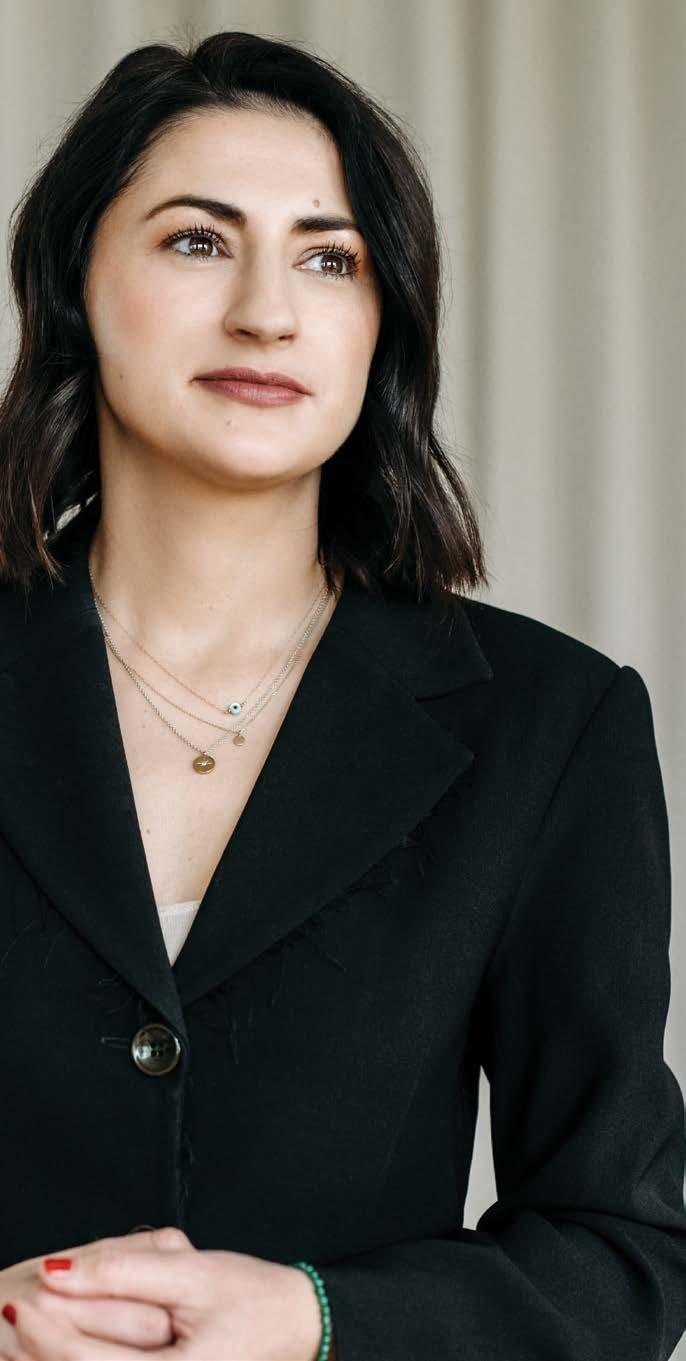
That decision by Jordanova has certainly snowballed into a much larger movement. Today, Plan A partners with over a thousand organizations, including global names like BMW, Chloé, the European Commission, APAX, and BNP Paribas. In 2020, to further her sustainability-oriented vision, Jordanova also co-founded Greentech Alliance– a network of 3,500 climate-focused companies supported by more than 500 advisors across venture capital, media, and industry. “The biggest barrier is moving from bold commitments to actual action, and it comes down to data,” she says. “Most companies don’t have the information they need to prioritise initiatives that deliver real financial and environmental returns. They make ambitious pledges without clarity on where their emissions are highest, especially in Scope 3, or which actions will give them the strongest ROI. The result? Sustainability becomes a side project or public relations (PR) exercise instead of a business driver.”
The key to ensuring sustainability is truly data-driven lies in leveraging technology –particularly artificial intelligence (AI)– wisely, says Jordanova. “At Plan A, we’ve built AI-powered tools that collect and benchmark emissions data, then model different pathways with clear cost-benefit analysis,” she explains. “Our new anomaly detection feature automatically flags inconsistencies in emissions data, making it easier for businesses to track performance, ensure quality, and connect environmental wins to financial returns.”
“In the UAE, this matters more than ever!” Jordanova adds. “The new Climate Change Law makes sustainability reporting mandatory.

Pledges now carry legal, financial, and reputational consequences. Companies that build the right tech infrastructure early turn compliance into competitive advantage. They avoid penalties up to AED4 million, reduce operational risk, and build stakeholder confidence. With AI, businesses can meet requirements while turning commitments into measurable, profitable outcomes.”
Such efforts and attention to detail from Jordanova have earned her multiple accolades along the way, including being recognised as Obama Leader Europe 2022, MIT Innovator Under 35 Europe 2022, Marshall Fund Fellow 2022, and Top 50 Women in Tech in Germany 2021 (Handelsblatt), among others. But for the co-founder herself, such awards have only strengthened her resolve to make sustainability-driven operations the plan A (pun intended!) for businesses worldwide. “I see recognition as responsibility, a lever to drive the systemic shift we need,” she says. “Since co-founding Plan A and the Greentech Alliance, my focus has been closing a critical gap: moving sustainability from aspiration to data-driven investment. At Plan A, we use this visibility to sit with business leaders and replace inspiration with proof. We show the quantifiable ROI of climate action with precise metrics and financial models that secure rapid buy-in. We demonstrate that sustainability is the smart, profitable decision, then scale these models across the ecosystem to turn commitments into bankable results. We use recognition not for acclaim, but to amplify actionable data that helps decision-makers build more resilient, profitable businesses.”
As such, Jordanova’s insights can certainly prove to be important to up and coming startup founders and entrepreneurs who want to be more
The question isn’t whether sustainability matters–it’s whether you’re moving on it while competitors hesitate. Founders who act early are building leaner operations, raising capital more e asily, and taking market share from slower incumbents.”
eco-aligned in their business models. “My advice for founders is straightforward: start with assessment, then integrate, then lead,” Jordanova says. “First, understand your environmental impact. Measure three things: your emissions, your supply chain vulnerabilities, and your climate risks. You can’t manage what you don’t measure, and investors will increasingly ask for this data when evaluating whether your business can withstand future shocks. Second, make sustainability part of your core strategy, not a separate project. Focus on initiatives that improve both your environmental footprint and your financials. Real examples include locking in renewable energy contracts at lower rates, cutting waste to boost margins, creating circular models that open new revenue, or designing sustainable products that justify premium pricing. These aren’t costs. They’re investments that improve your unit economics. Third, treat compliance as the baseline. Meeting the UAE’s Climate Change Law requirements gets you in the game, but it won’t differentiate you. The real opportunity is using sustainability to innovate ahead of competitors, attract institutional capital, hire better talent, and build a brand that resonates with today’s customers.”
“The question isn’t whether sustainability matters– it’s whether you’re moving on it while competitors hesitate,” Jordanova declares. “Founders who act early are building leaner operations, raising capital more easily, and taking market share from slower incumbents. It’s worth the effort.”
Lubomila Jordanova, co-founder and CEO of Plan A, shares
the traits exhibited by companies that have successfully incorporated sustainability into their operations
} “The most successful companies treat sustainability as a profit driver, not a cost or compliance burden. They integrate it into product design, procurement, and operations, not just year-end reports.
Second, they commit to data and scientific rigour. Companies that accurately measure Scope 1, 2, and 3 emissions, set science-based targets, and track progress outperform their peers both environmentally and financially. This precision lets them capture real value: cost savings through efficiency, reduced exposure to carbon pricing and regulation, stronger brand reputation, and better access to talent and capital.
We consistently see that early movers enjoy better margins and lower financing costs. They also embrace collaboration, partnering with greentech startups, supply chains, and policymakers to accelerate innovation, share costs, and mitigate risk. In the UAE, the Climate Change Law has accelerated this. Companies aren't asking if they need to act. They're asking how fast they can build systems to track emissions and embed decarbonisation at the core of their business model.



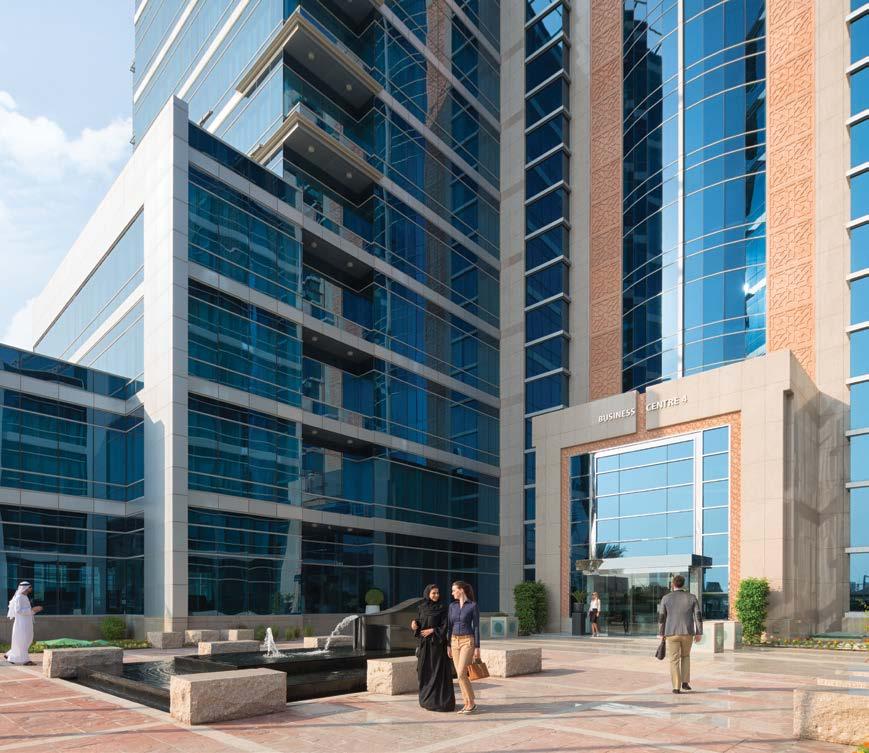
From carpets and cosmetics to components used in the nuclear energy sector, here’s an in-depth look at how the many manufacturing hubs at RAKEZ are enabling the production of diverse products in the UAE. by
AALIA MEHREEN AHMED
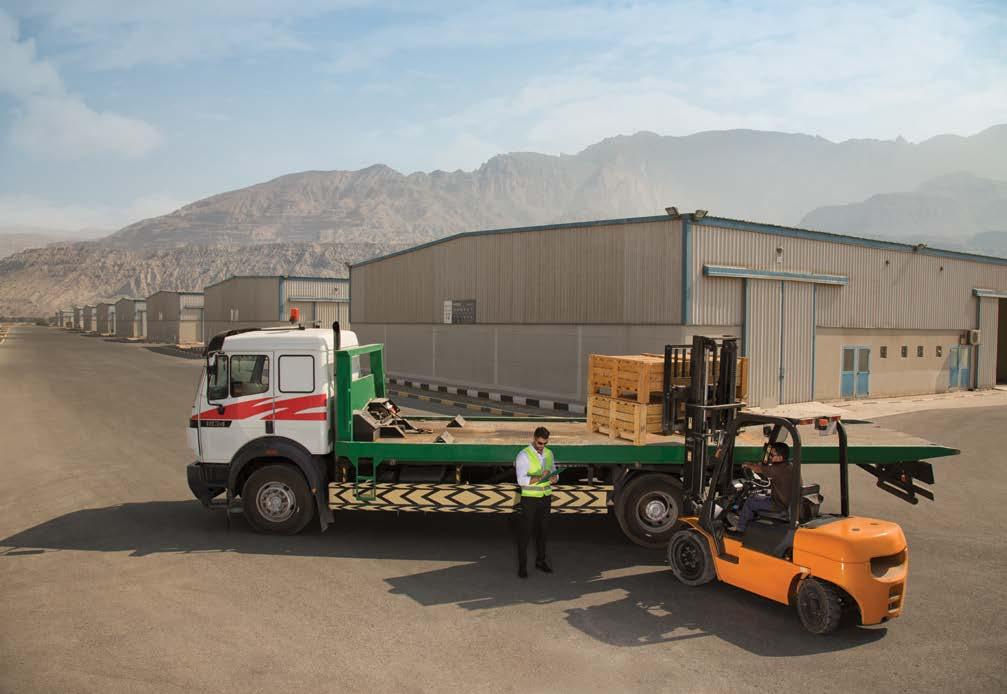
The UAE’s manufacturing sector has firmly established itself as a key pillar of the nation’s non-oil economy. In June 2025, a report by the Federal Competitiveness and Statistics Centre revealed that the UAE’s manufacturing sector accounted for a significant 13.8% of the nation’s non-oil GDP in 2024 – a number that is expected to have risen in 2025. The statistic, of course, is a reflection of the many initiatives the UAE government has put in place to ensure such growth – the most prominent of these being the Operation 300bn strategy by
the Ministry of Industry and Advanced Technology (MoIAT) which aims to raise the industrial sector’s contribution to the GDP from AED133 billion to AED300 billion by 2031. To bolster such ambitions, the MoIAT also launched the Make it in the Emirates - a national campaign driving industrial self-sufficiency and global competitiveness. At the heart of this collective movement to steer the UAE’s GDP towards more non-oil, future-focused industries is the Ras Al Khaimah Economic Zone (RAKEZ) and its three dedicated industrial zones: namely, Al Hamra Industrial Zone; Al Ghail Industrial Zone; and Al Hulaila Industrial Zone.
Aversatile hub for light and heavy industries, Al Hamra offers flexible setups for both free zone and non-free zone entities. With ready warehouses, land plots, and on-site accommodations, it provides seamless access to major ports and airports for efficient logistics and exports. On the other hand, Al Ghail offers extensive land plots with robust infrastructure and excellent connectivity to
key transport routes. Built for large-scale and heavy manufacturing operations, it is often deemed the most ideal for investors seeking to establish substantial industrial bases. Finally, there is Al Hulaila, which is specifically tailored for heavy industrial activities, providing customizable land plots and state-of-the-art warehouses designed to accommodate large-scale manufacturing needs.
All of RAKEZ’s endeavors, of course, are a testament to the consistently rapid economic growth shown by Ras Al Khaimah, in and of itself. Today, Ras Al Khaimah’s GDP is about US$12 billion. With a diverse economic profile –which has resulted in the emirate being home to 50,000 businesses from 100 countries, representing over 50 economic fields – its largest segment is manufacturing, making up about 27% of GDP.
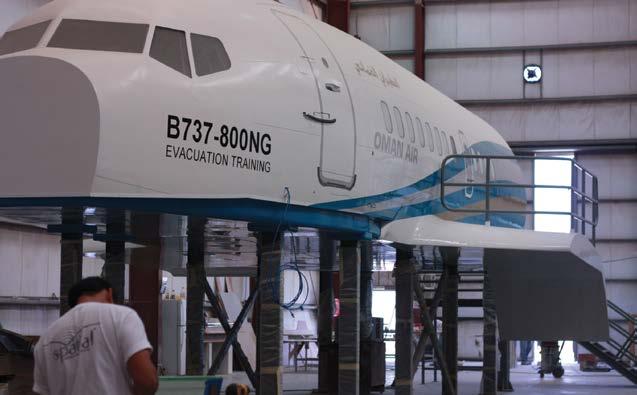
In this particular article, we take a look at some of the many diverse success stories that have already been launched and nurtured within RAKEZ’s manufacturing hubs – and, in turn, spotlight how local manufacturing is all set to champion the growth of the UAE’s economy.
Manufactures cabin crew training equipment, including trainers for cockpit and cabin emergency evacuations for the aviation sector
Founded in 2007, Spatial Composite emerged as a pioneer in designing and manufacturing cabin-crew training equipment. What began with a bespoke project for Emirates Airlines quickly evolved into a global enterprise serving leading carriers including United Airlines, Delta, Virgin, Singapore Airlines, and Lufthansa.
After relocating to RAKEZ’s Al Hamra Industrial Zone in 2009, the company benefited from the free zone’s supportive infrastructure and flexibility, which helped it refine the durability and quality of its high-volume training simulators.
Looking ahead, Spatial plans major expansion with a move to a larger RAKEZ-supported facility and increased presence in the Asia-Pacific region, complementing its established markets in North America and the Middle East. Emphasizing the importance of strong teams, financial discipline, and continuous learning, Spatial credits RAKEZ as a long-term
AT THE HEART OF A COLLECTIVE MOVEMENT TO STEER THE UAE’S GDP TOWARDS MORE NON-OIL, FUTURE-FOCUSED INDUSTRIES IS THE RAS AL KHAIMAH ECONOMIC ZONE (RAKEZ) AND ITS THREE DEDICATED INDUSTRIAL ZONES: NAMELY, AL HAMRA INDUSTRIAL ZONE; AL GHAIL INDUSTRIAL ZONE; AND AL HULAILA INDUSTRIAL ZONE.
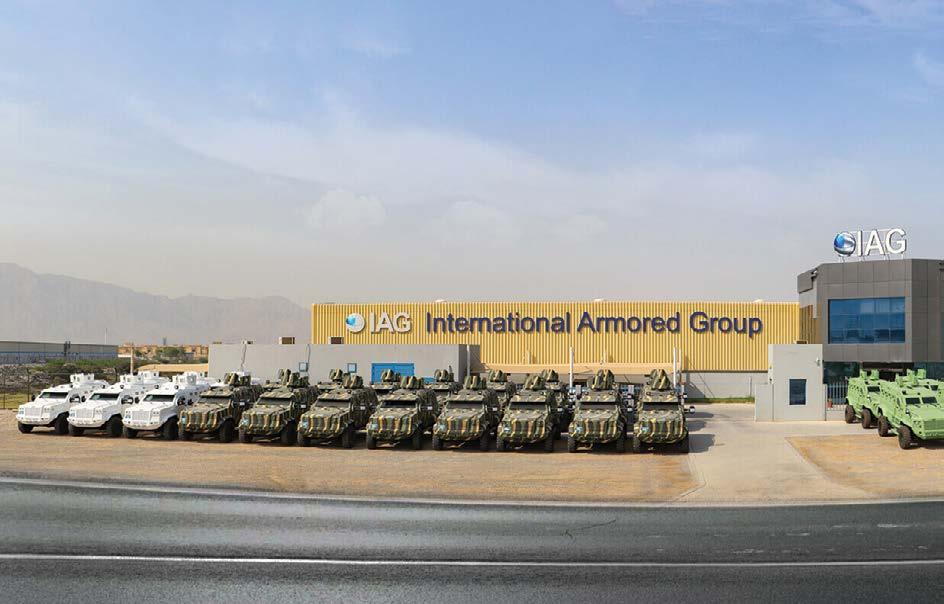
→ International Armored Group produces armoured commercial and tactical vehicles
partner that streamlines its operations and enables sustained growth in a specialized, safety-critical industry.
}INTERNATIONAL ARMORED GROUP (IAG)
Manufactures armoured commercial and tactical vehicles as well as armoured components for the defense and security sector.
International Armored Group (IAG), a global leader in armored vehicle manufacturing, operates major production facilities across the United States, the United Arab Emirates, and Türkiye, with its UAE headquarters strategically located in RAKEZ’s Al Hamra Industrial Zone.
From this 400,000 sq.ft site—part of RAKEZ’s world-class
manufacturing ecosystem—IAG produces a wide range of armored vehicles for defense, security, and humanitarian applications, serving markets across the Middle East, Africa, and beyond. With a total of 600,000 sq.ft of global manufacturing space, the company has the capacity to deliver up to 250 armored vehicles per month, supported by advanced engineering and quality-control systems.
RAKEZ’s infrastructure and business-friendly environment have enabled IAG to integrate critical functions under one roof, including fabrication, painting, upholstery, R&D, ballistic glass production, ambulance conversions, vehicle testing, and training. The company’s vertically integrated model—producing most components in-house—allows tighter control over quality, innovation, and supply chain efficiency, solidifying IAG’s
reputation as a trusted provider of advanced armored solutions worldwide.
advanced, computer-controlled LED lighting systems and video screens using German technology, serving the entertainment and hospitality sectors across the

}MAXTRON SHOW LIGHTING
Produces sustainable LED lighting systems for international markets for the events sector.
Maxtron Show Lighting (MSL), a family-owned lighting technology company from China, has established its first Middle East manufacturing base within RAKEZ’s Al Hamra Industrial Zone. The 1,200 sq.m facility produces
UAE, Europe, and the United States. With existing offices in the US and Germany, the company’s decision to relocate its eastern headquarters to Ras Al Khaimah marked a strategic milestone in its global expansion, reinforcing the UAE’s position as a regional manufacturing hub. RAKEZ’s customized support, cost-effective setup
solutions, and logistics connectivity were key factors in MSL’s decision to invest in the emirate after an extensive search across the UAE. MSL’s two decades of expertise landed collaborations with major clients such as Global Village and the former Bollywood Parks Dubai.
}SOBHA MODULAR INDUSTRIES
Manufactures aluminium facades and bathroom pods for the construction sector.
Sobha Modular Industries, a subsidiary of the Sobha Group, inaugurated a cutting-edge 250,000 sq.m manufacturing facility in RAKEZ’s Al Hamra Industrial Zone in June 2024, in the presence of His Highness Sheikh Saud bin Saqr Al Qasimi, UAE Supreme Council Member and Ruler of Ras Al Khaimah. The advanced plant produces aluminium façades and bathroom pods using AI-powered CNC machines and robotics, with an initial capacity of 50 pods per day and 1,800 sq.m of aluminium products daily. The facility is projected to COMBINING AUTOMATION, SUSTAINABILITY, AND SCALABILITY,
SOBHA MODULAR INDUSTRIES AIMS TO CHAMPION RAS AL KHAIMAH’S STRATEGIC ADVANTAGES —SUCH AS PROXIMITY TO RAW MATERIALS, COST-EFFECTIVE OPERATIONS, AND PROGRESSIVE REGULATION— TO REDEFINE REGIONAL MANUFACTURING AND ADVANCE THE UAE’S MAKE IT IN THE EMIRATES AGENDA.

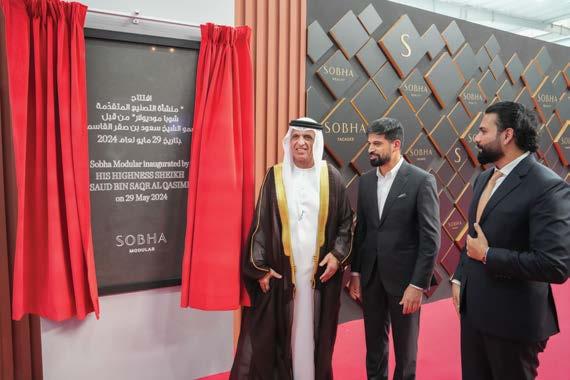
create over 3,000 jobs, further strengthening Ras Al Khaimah’s position as a national hub for innovation-driven manufacturing.
The project represents a significant milestone in the UAE’s industrial diversification, supported by RAKEZ’s world-class infrastructure and business ecosystem. Combining automation, sustainability, and scalability, Sobha Modular Industries aims to champion Ras Al Khaimah’s strategic advantages —such as proximity to raw materials, cost-effective operations, and progressive regulation— to redefine regional manufacturing and advance the UAE’s Make it in the Emirates agenda.
Produces gaskets for sealing purposes in diverse industries, including energy and other heavy materials.
With over 110 years of global expertise, the Flexitallic Group stands as a world leader in static sealing solutions—designing and manufacturing advanced gaskets, sealing products, and flange management systems for industries spanning oil and gas, power generation, petrochemicals, and alternative energy.
TODAY, RAS AL KHAIMAH’S GDP IS ABOUT US$12 BILLION. WITH A DIVERSE ECONOMIC PROFILE
–WHICH HAS RESULTED IN THE EMIRATE BEING HOME TO 50,000 BUSINESSES FROM 100 COUNTRIES, REPRESENTING OVER 50 ECONOMIC FIELDS – ITS LARGEST SEGMENT IS MANUFACTURING, MAKING UP ABOUT 27% OF GDP.
Headquartered in Houston, the company operates across 13 countries, with one of its most advanced facilities located in RAKEZ’s Al Hamra Industrial Zone. Established in 2014 on a 10,000 sq.m site, the plant is among the largest gasket manufacturing units in the Middle East, serving regional demand with precision, speed, and consistent product excellence.
RAKEZ’s supportive ecosystem and streamlined services have been pivotal in Flexitallic’s success—from overcoming early infrastructural challenges to achieving over 2,000 consecutive injury-free days through rigorous safety and quality standards. This facility has since become the region’s only nuclearapproved gasket manufacturer. As Flexitallic positions its RAK plant as the manufacturing hub for the Middle East, it continues to expand into GCC and North African markets, with RAKEZ’s businessfriendly framework and dedicated support serving as a cornerstone of its continued innovation and growth.
↓ Flexitallic manufactures gaskets for sealing purposes in diverse industries like energy
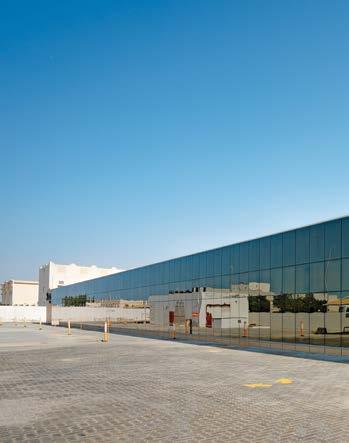
Produces natural tanning creams and sprays for the beauty sector across 30 nations worldwide.
Founded in 1990 in Lebanon, Carrot Sun began with a simple mission—to create a natural tanning product that delivers not just a tan, but a healthy glow. Over the years, it became a trusted sun-care brand across 35 countries, recognized for its signature golden finish and natural formulations.
In 2021, the company entered a transformative new phase by relocating to the UAE, where it found an ideal home within RAKEZ’s supportive business ecosystem. The move enabled Carrot Sun to restructure
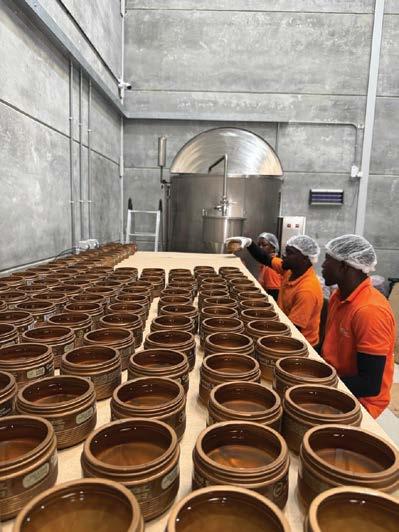
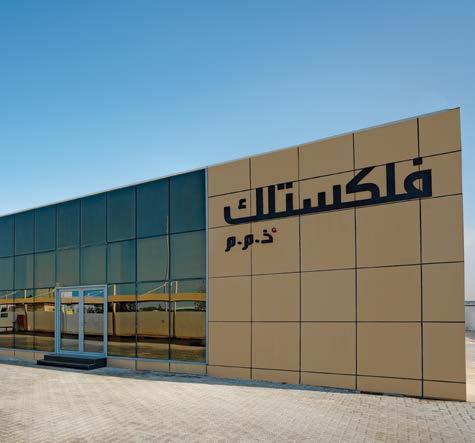
in more than 30 countries, expanding its product line beyond tanning into the broader realm of sun wellness and skincare innovation. With RAKEZ’s responsive account management and scalable production support, the brand enhanced its agility and operational efficiency, positioning itself for sustainable global growth.
Manufactures asphalt for the construction sector.
Founded in 1997 by Ihsan Kerbaj, Fala Group has today grown into a diversified, second-generation family enterprise led today by his sons — Koussei, Hani, and Nour. Guided by the founding philosophy of honesty, dedication, and consistency, Fala Group has become synony-

operations, adapt formulations to meet international standards, and maintain full ownership while leveraging RAKEZ’s streamlined setup, licensing support, and industrial infrastructure.
Today, Carrot Sun operates
mous with reliability and scale in the UAE’s infrastructure and construction landscape. A defining milestone came in 2012, when Fala Group partnered with RAKEZ, investing over AED 200 million in Al Ghail Industrial Zone to establish a

large-scale asphalt plant, fleet operations base, and labor accommodations. This expansion doubled its workforce to nearly 2,000 employees and enabled delivery of major projects such as the Emirates Road extension, Mebreh mountain road, and Etihad Road upgrades.
Today, with interests spanning construction, real estate, education, medical trading, and e-commerce, Fala Group continues to invest in Ras Al Khaimah’s industrial growth, strengthened by its enduring collaboration with RAKEZ and its unwavering adherence to its founder’s guiding values.
Produces high-end, custom-made solutions for exhibitions across the region for the events sector. Founded 32 years ago, Electra has today evolved into a regional powerhouse of over 550 employees, known for
delivering fully integrated production, technical, and project management services across the Middle East. From Art Dubai and Downtown Design to EXPO 2020 and the FIFA World Cup, Electra’s portfolio reflects a consistent record of excellence, creativity, and precision.
The company’s rise has been shaped by its commitment to quality, innovation, and client trust, strengthened by the strategic infrastructure and business support offered by
RAKEZ, which enabled seamless manufacturing and logistics operations. Backed by RAKEZ’s efficient customs and business ecosystem, the company continues to champion eco-friendly practices, aligning with the global “Net Zero Carbon Events by 2050” initiative. As Electra expands regionally — including plans for a new factory in Saudi Arabia and the launch of sustainable product lines — it remains focused on innovation, customer satisfaction,
and continuous improvement. As such, its enduring partnership with RAKEZ underscores a shared vision of supporting the UAE’s creative economy and setting new benchmarks in event production excellence.
Produces stainless-steel food processing tanks for the food industry.
Founded in 1997 by a team of Danish engineers and Saudi entrepreneurs, Swedinox International began with a clear mission — to simplify the challenges of importing food processing tanks from Europe by producing them locally. What started as a small fabrication initiative in Saudi Arabia has evolved into a leading regional manufacturer known for high-quality, locally built stainless-steel tanks and industrial equipment.
In 2007, responding to growing demand, Swedinox expanded operations to the UAE, establishing a state-of-the-art factory in
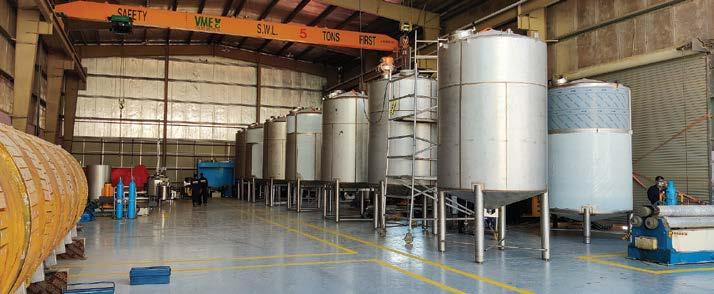
RAKEZ’s Al Ghail Industrial Zone. With RAKEZ’s assistance in licensing and infrastructure support, the company was able to scale efficiently while maintaining its commitment to precision engineering, sustainability, and customer trust.
the beauty and wellness sector.
Dabur Naturelle, a subsidiary of renowned India-based Dabur Group, established a branch in Ras Al Khaimah Economic Zone (RAKEZ) to serve its growing markets across the Middle East, Africa, and beyond. Built on
enabled the company to leverage the emirate’s world-class infrastructure, logistics connectivity, and cost-efficient manufacturing environment, reinforcing its role as a key export and innovation hub for Dabur’s international portfolio.
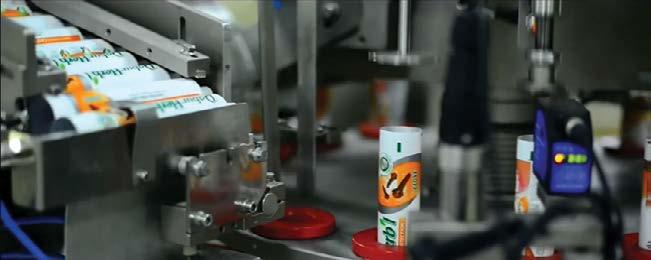
Today, Swedinox stands out for offering cost-effective, sustainable alternatives to imported industrial equipment—delivering faster turnaround times and reduced transportation costs while meeting international quality standards. Its innovations include systems that minimize water consumption in food processing, underscoring a strong environmental ethos. Looking ahead, the company plans to develop solar-powered, self-sustainable equipment housed in containers for easier export, while continuing to expand within RAKEZ’s thriving industrial ecosystem.
}DABUR NATURELE
Produces healthcare and personal care products for
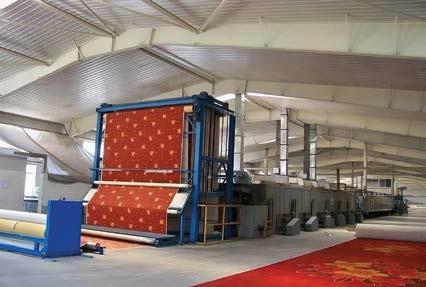
Dabur’s 140-year legacy of blending nature with science, Dabur Naturelle’s facility in Al Hamra Industrial Zone manufactures a wide range of personal care, skincare, and wellness products tailored to diverse regional consumer needs.
The move to RAKEZ
Through its RAKEZ-based operations, Dabur Naturelle continues to embody the brand’s philosophy of natural innovation and sustainable production. With a focus on advanced formulations, eco-conscious packaging, and continuous R&D, the company is expanding its footprint across global
}NAYYER CARPET
Produces carpets for the GCC markets. Nayyer Group, a geotextile and carpet manufacturer from Pakistan, expanded its global footprint with the launch of Nayyer Carpets, a new 57,000 sq.m manufacturing facility in RAKEZ’s Al Ghail Industrial Zone in October 2024. Equipped with state-of-the-art technology, the plant produces a wide range of products including needle loom felt, geotextiles, wall-to-wall carpets, and artificial grass carpets.
With a production capacity exceeding 50 million sq.m annually, Nayyer Carpets is positioned to serve markets across the GCC, Africa, India, and Pakistan, reflecting the Group’s strategic push to scale its international operations from Ras Al Khaimah’s industrial base.
Backed by RAKEZ’s advanced infrastructure and seamless setup processes, Nayyer Group plans to double both its workforce and production output annually as it grows its presence in the region. As part of a growing community of Pakistani investors in RAKEZ, Nayyer Carpets’ investment reinforces Ras Al Khaimah’s position as a thriving ecosystem for innovation, export manufacturing, and long-term industrial growth.
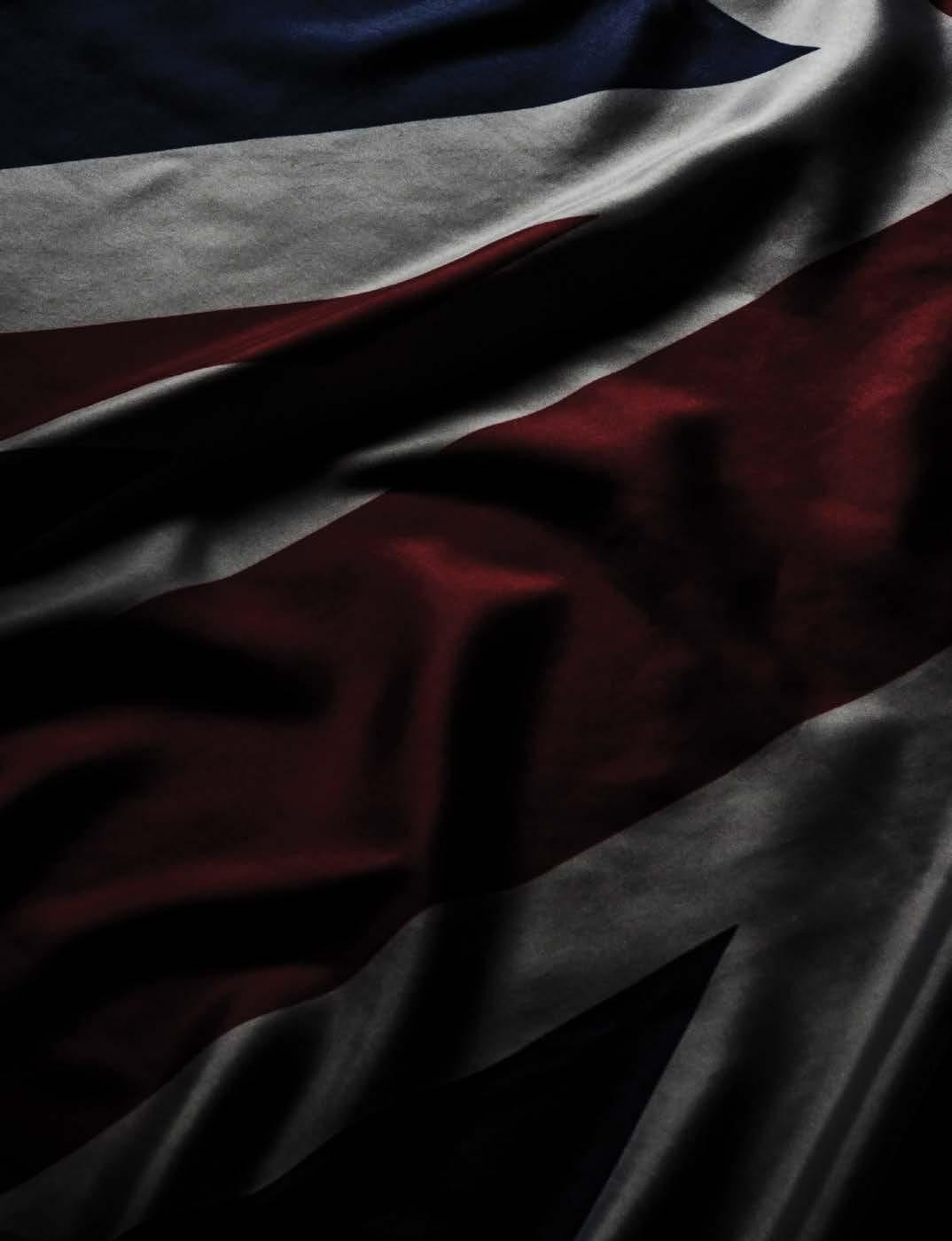
From better goods to better wardrobe bests, every issue, we choose a few items that make the approved executive selection list. In this edition, our picks are from Beauty Club London - Dubai, BienEtre, and Shiseido.
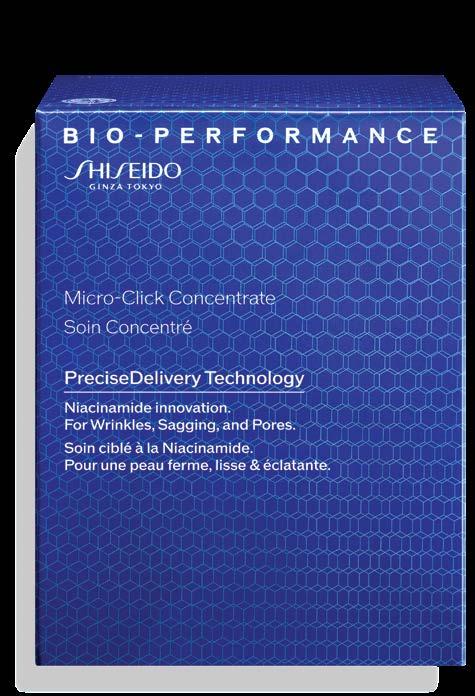
MICRO-CLICK CONCENTRATE ↓
Combining clinical precision with cuttingedge skincare.
A targeted non-invasive, innovative treatment to visibly lift skin, reduce wrinkles, and minimize pores. At its core is Shiseido PreciseDelivery Technology™, a patented system engineered to deliver the formula at the optimal depth of the skin for maximum efficacy.
This innovation is inspired by the precision of high-performance aesthetic procedures, while remaining suitable for at-home use. The hero ingredient is niacinamide, renowned for its multi-corrective properties. A powerful form of vitamin B3, known to support collagen synthesis, improve skin firmness, enhance epidermal turnover, and strengthen the skin barrier.
This product embodies Shiseido’s commitment to combining clinical precision with cutting-edge skincare. www.shiseido.me
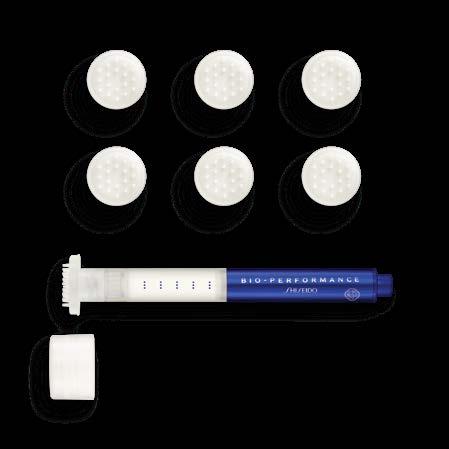


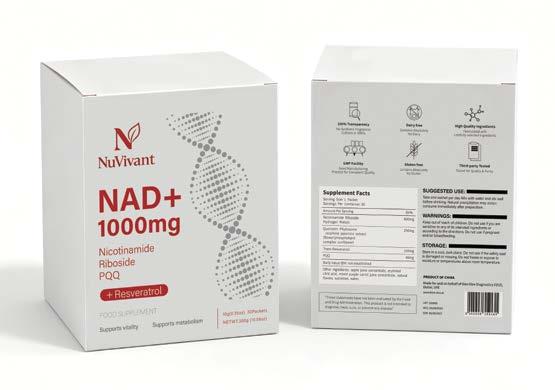
Individuals deserve care that is as unique as they are.
Bien-Être, a consumer health-tech company dedicated to extending healthspan, has launched its supplement brand NuVivant in the Middle East.
Founded by Aly Rahimtoola, BienÊtre was born from a decade-long realization: the “one-size-fits-all” approach of traditional skincare and health products fails to address individual biological differences. Rahimtoola’s vision evolved into creating a platform where science and technology merge to make better living measurable and achievable — especially as global healthcare systems face mounting strain.
NuVivant’s debut collection introduces a NAD+ Booster Supplement and the region’s first at-home NAD Intracellular Test Kit, enabling users to quantify and enhance their cellular energy levels.
NAD+ (nicotinamide adenine dinucleotide) is a vital coenzyme found in every cell, responsible for energy production, DNA repair, and cellular health. As NAD+ levels naturally decline with age, boosting them has become a focal point in longevity science.
What sets NuVivant apart is its Four-Pathway Cellular Optimization System, a proprietary formulation that targets multiple mechanisms of cellular aging rather than relying on a single compound. Complementing the supplement is a first-of-its-kind at-home NAD+ Intracellular Test Kit, which allows individuals to collect a small blood sample from home. The sample is processed in CLIA-certified U.S. labs, generating detailed insights into cellular health and energy markers.
Results are delivered digitally through a personalized membership model, allowing users to track progress and adjust their supplement plans over time.
bien-etre.ai
A destination where quality, not quantity, defines indulgence.
Following its international acclaim as one of the world’s top destinations for hair colour and extensions, Beauty Club London has opened its first overseas salon at the Metropolitan Hotel Dubai—and it brings every bit of London’s polish and precision with it. Founded by renowned experts Louise Bailey and Moe Harb, Beauty Club London is celebrated for its artistry, professionalism, and discreet

luxury. Its flagship in Oxford Circus has long been a magnet for global clients and celebrities who seek the kind of hair perfection that looks effortless but is achieved only through mastery. Now, Dubai’s stylesavvy crowd can experience the same. From the moment I stepped inside, the team’s attention to detail was striking. The consultation felt more like a collaboration— every suggestion grounded in technical expertise and genuine care. My haircut,
executed with surgical precision, felt instantly lighter and more flattering, yet required minimal styling afterward—proof of true craftsmanship.
In a city known for luxury, Beauty Club London - Dubai feels refreshingly authentic—a destination where quality, not quantity, defines indulgence.
instagram.com/beautyclublondon_dubai/ beautyclublondon.co.uk
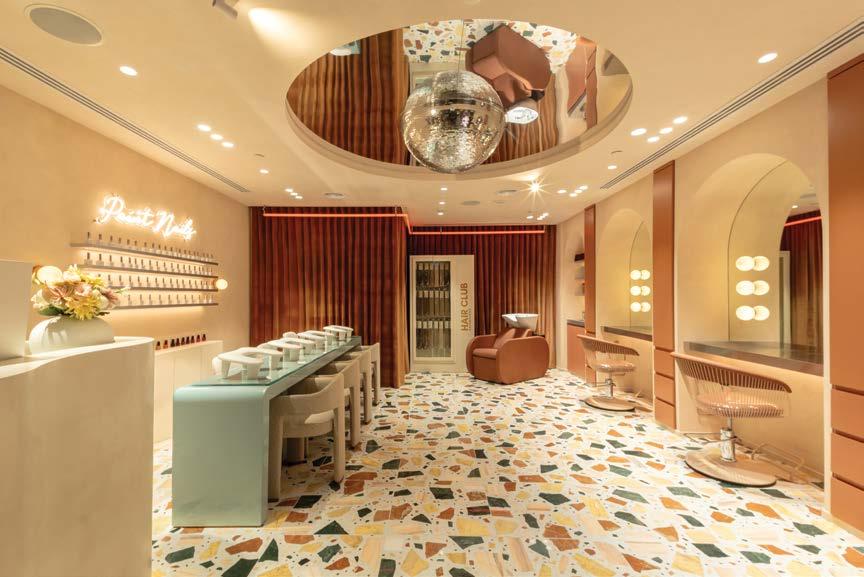


17-20 NOVEMBER 2025
Riyadh Exhibition & Convention Centre (Malham), Saudi Arabia
MOST ATTENDED REAL ESTATE EVENT

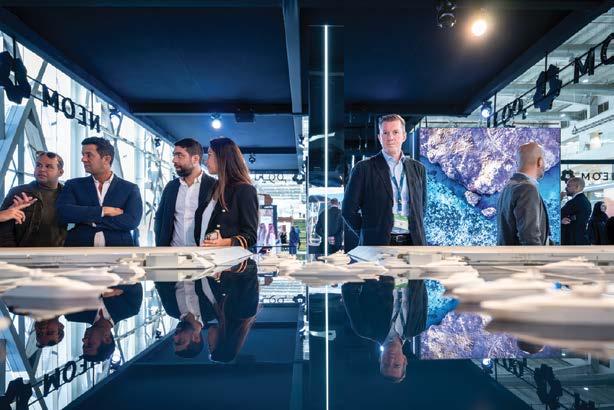
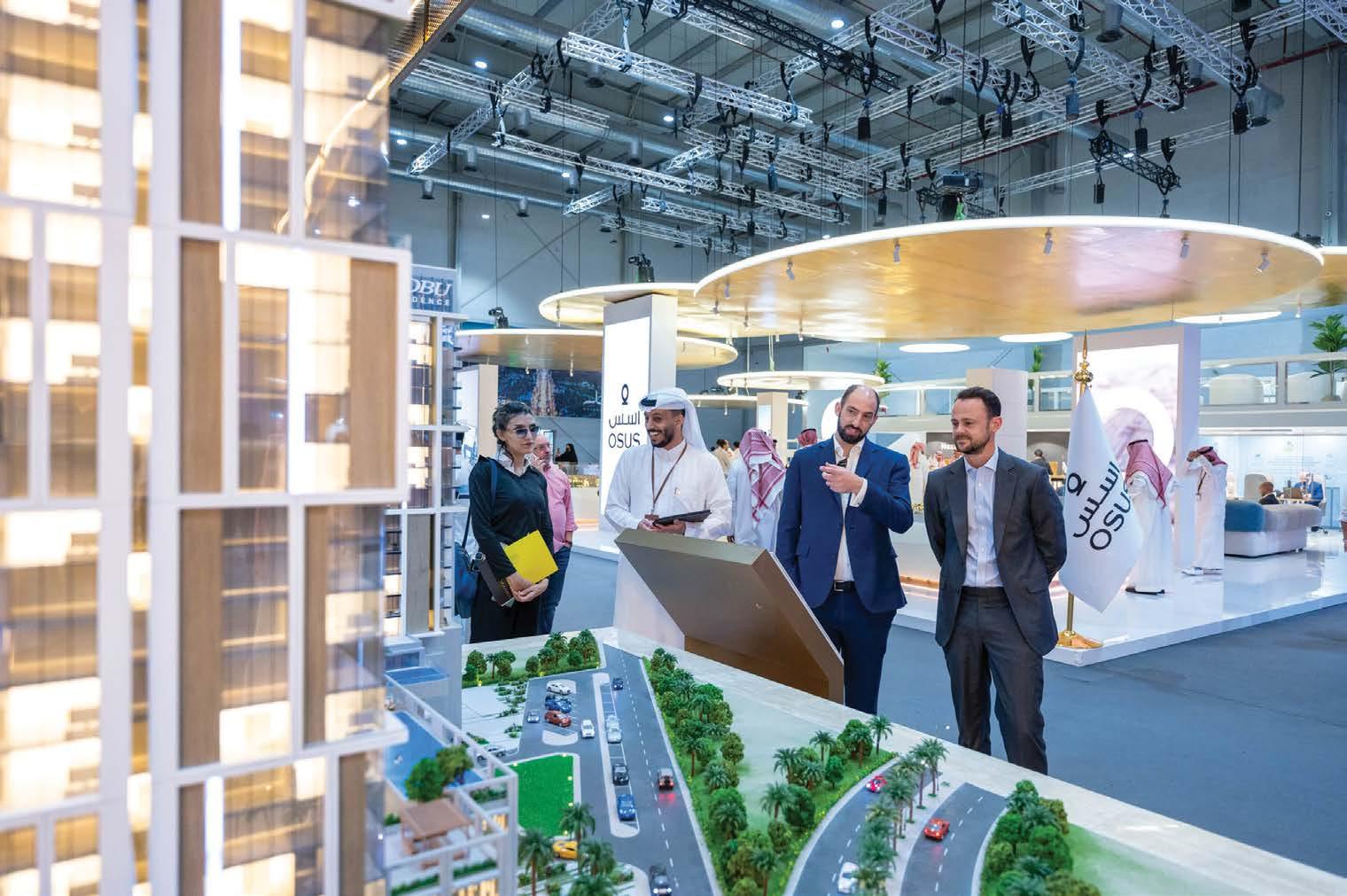
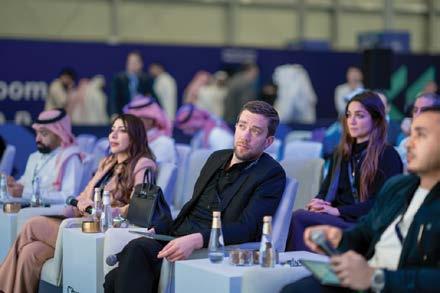
40 Countries Exhibiting
460+ Exhibitors
10 Country Pavilions
450+ Speakers
4 Stages


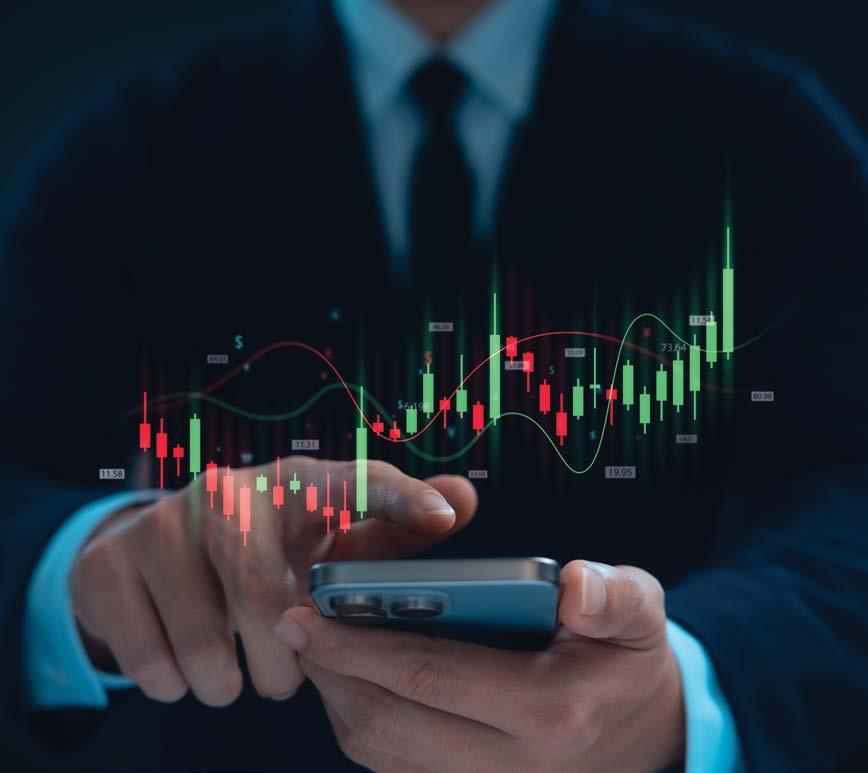
A series of articles where the MENA region’s leading venture capitalists share practical advice to help founders navigate the challenges of building and scaling a startup.
by TAMARA PUPIC
Can you share a personal anecdote, either a pitch that truly impressed you, or one that missed the mark and why?
I once backed a founder for months who had built a solid MVP and showed real motivation - but completely fell apart during the investment committee presentation. He was extremely shy, couldn't articulate why we should invest, and failed to convey the impact his company could have in the market. We didn't move forward.
At the time, it felt unfair to me - like Amazon's approach of having people write memos instead of presenting, which gave everyone an equal chance to convince, regardless of their presentation skills. But in venture capital, execution matters as much as the idea, and if you can't sell your vision to a room of friendly investors, how will you sell to customers, recruit talent, or rally your team during tough times?
Recently, I met a founder in the sports industry, which is entirely outside my area of expertise and interest, not a


sector I typically invest in. But within minutes, he had me convinced. Why? Deep domain expertise. He knew his space inside and out, could explain complex opportunities in simple terms, and could defend his thesis against any criticism. His clarity and conviction made him credible, even though I know nothing about football. We ended up writing a small check, ensuring he'd get the technical support to execute his vision. The lesson? You don't need to be the most polished presenter, but you do need to show you're the right person to solve this problem. Mastery of your domain beats charisma every time.
} We focus on sectors where we can drive real societal impact: proptech, construction tech, and healthtech. These aren't the flashiest spaces, but they touch how people live, work, and stay healthy - foundational aspects of society. By focusing vertically on these specialized sectors rather than spreading ourselves thin, we can go deep and truly understand where the transformation is happening. What makes this moment exciting is that AI is fundamentally reshaping how these sectors operate. In proptech, we're seeing marketplaces evolve beyond listings - they're becoming intelligent ecosystems that streamline people's lives through digital interfaces. Generative AI creates new ways to interact with both structured and unstructured data, making property search, management, and transactions simpler and more intelligent. What used to require multiple platforms and manual processes can now happen conversationally through AI interfaces.
Founder BLOCKTECH GROUP
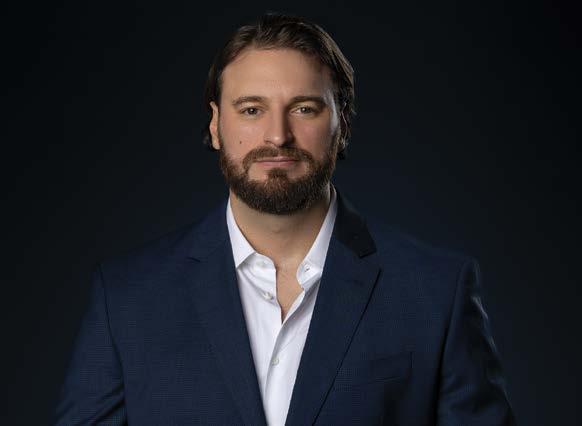

Can you share a personal anecdote, either a pitch that truly impressed you, or one that missed the mark, and why?
One that stands out came from a founder who wasn't trying to impress anyone. No theatrics, no buzzwords — just a simple, structured conversation about how they designed resilience into their model. They had mapped out failure points, backup systems, and what "stress" would look like operationally.
What struck me was their mindset. They didn't talk about their product as a dream — they spoke about it as a system. Every part had a reason to exist. It reminded me that promising founders are builders first; they think about stability before success.
On the other side, I've seen many pitches collapse because they were built on surface-level
confidence. The story was strong, but it lacked depth. I've learned that it's not the intensity of belief that convinces investors; it's the clarity of thought. A founder who can explain what could go wrong — and how they'll respond — earns far more trust than one who insists nothing ever will.
The most enormous red flag right now is mistaking visibility for progress. It's easy to get attention — a viral post, a new funding announcement, a quick pilot partnership — but those don't always translate into traction. If a business can't show repeatable behavior from customers or predictable outcomes from operations, it's not ready. Another red flag is a poor understanding of regulation. In fast-moving fields like AI, fintech, or blockchain, ignoring policy is almost irresponsible. You can't build for the future if you don't understand the rules that
} Cybersecurity continues to dominate the conversation, and rightly so. It's no longer an IT department issue — it's a boardroom priority. Every company now operates in a digital battlefield, and resilience depends on how well you protect identity, data, and continuity.
I'm also paying attention to AI governance and ethics — not just how AI performs, but how it behaves. Companies that build transparency and accountability into their models will lead the next wave of digital trust.
Then there's the ongoing fusion between Web3 and gaming ecosystems. What's happening in gaming — tokenized incentives, microtransactions, community-led economies — is quietly reshaping how people engage with digital value. It's a preview of how broader digital economies will function.
MENA is well-positioned for this evolution. It has youthful energy, strategic ambition, and a willingness to experiment. The real test will be consistency — whether the region can keep translating potential into lasting infrastructure. In the end, the most exciting sectors are those where technology meets purpose — where innovation doesn't just create speed, but stability.
will shape it. As for the traits I'd like to see more of — humility and structure. Humility to question assumptions, and structure to turn a vision into something testable and measurable. The best founders don't get
defensive when challenged. They use feedback as data. Resilience isn't just emotional toughness; it's intellectual flexibility. The founders who stand out in 2025 will be the ones who stay curious, not just confident.
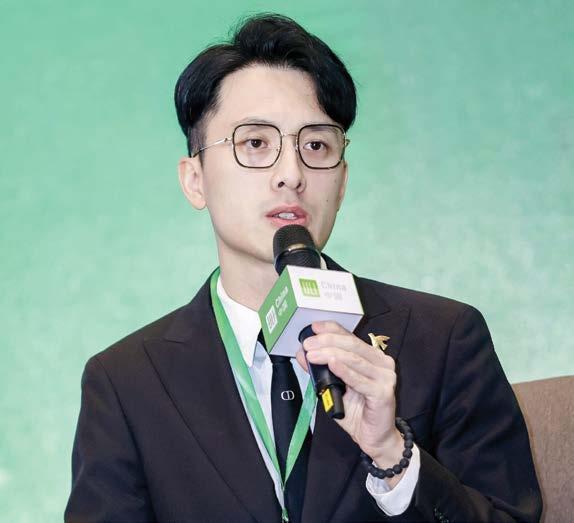
Born in Hong Kong, NEXX is now building the next generation of intelligent supply chains in Qatar, combining AI, data, and local insight to power the region’s logistics future. by
TAMARA PUPIC
The story of NEXX began when Oscar Hui Ka (now its CEO, Professor Yu Bee (now its Chief Scientist), John Chan (now its Chairman) set out to transform an aging industrial building in Hong Kong into a fully automated cold storage facility. Despite widespread skepticism about its limited capacity and inefficient multi-floor layout, the team applied advanced AI-driven optimization to redesign the warehouse’s resource allocation. The result was a breakthrough in operational efficiency that turned the project into a regional benchmark for smart warehousing. This success became the foundation for a broader vision shared with Houston Huang, then CEO of J.P. Morgan China, to build a company capable of redefining global logistics. Together, they established NEXX, a Hong Kong-based enterprise
specializing in AI-powered supply chains and intelligent warehouse systems.
Guided by their belief that global logistics routes are being redefined by new dynamics in international trade, the NEXX team has turned its attention to exploring opportunities in Qatar. “We believe the GCC will emerge as the logistics hub connecting Asia, Europe, and Africa,” Ka notes. “NEXX is fully committed to leveraging our proprietary AI logistics technology as a catalyst to build a world-class logistics ecosystem across the MENA region. Our initial focus will be on establishing a network of advanced logistics warehouses to accelerate this transformation.”
A core part of their strategy is to become a truly localized company in the GCC, rather than an external player serving the region. Establishing the NEXX regional headquarters within the GCC is central to achieving this vision, and Qatar quickly stood out as the ideal location—driven by several key factors. “Qatar has developed an exceptional educational ecosystem, and it has also strengthened its innovation landscape through robust support systems and growing venture capital frameworks,” Ka says. “By establishing our regional base in Qatar, we position ourselves at the center of MENA’s economic transformation while maintaining the local presence needed to build trust and foster strong partnerships across the region.”
Adding a NEXX MENA co-founder, Ibrahim Al-Derbasti, the company is now registered with the Qatar Financial Centre (QFC) and is participating in an accelerator program organized by TASMU. Out of Doha, the NEXX team is currently focused on advancing the company’s core product — NEXXBot, an AI-powered expert system specialized in supply chain management that combines industry knowledge, data-driven insights, and logistics expertise.
The team’s main challenge of building a company in Qatar has been product–market integration — ensuring their AI-driven solution fits the unique dynamics of the regional logistics ecosystem.
“Moving from Hong Kong to Qatar, we couldn’t assume that our existing product format and business model would directly apply. The key question was whether our core experience was relevant in a completely new cultural and commercial landscape,” Ka says. “To tackle this, we spearheaded a deep localization initiative, engaging in extensive conversations with potential clients and partners on the ground. This wasn’t about surfacelevel adjustments — it was about fundamentally understanding their unique workflows and pain points.”
The pivotal moment came when the NEXX team consciously shifted their perspective. “By viewing our operations through the lens of MENA clients and partners, we conducted a fundamental reassessment and ultimately redefined our value proposition,” Ka explains. “This process was transformative; we didn’t just find a ‘fit’ — we discovered a superior strategic blueprint. We successfully evolved into a powerful China–MENA operational model, and overcoming that initial integration challenge didn’t just solve a problem — it unlocked a much larger market opportunity for us.”
The benefits of setting up
in a country that prioritizes building a competitive, knowledge based economy and developing a world class logistics infrastructure, Ka explains, have been multiple. “Our smart fulfillment center at Milaha Logistics City is one benefit, but
NEXX has also built the AI Lab and R&D team with Chinese and Qatari local talents, in partnership with QSTP, by leveraging the resources of QRDI and Education City.
“We’ve also enjoyed unmatched financial incentives for technology transformation, such as the US$1billion Investment incentive Program from Invest Qatar, offering up to a 40% subsidy It is an unparalleled incentive that we have not found elsewhere. This powerful financial signal, directly linked to Qatar’s diversification agenda, confirms the nation’s serious commitment to tech
transformation. It is a primary reason we are not only proceeding with our current project but are also expecting and planning for more projects in Qatar, as we are confident in the long term, government backed push for technological driven logistics eco-system.”
While many founders look beyond Qatar in search of growth, NEXX has taken a different path. The company has developed a carefully calibrated expansion strategy that turns Qatar’s relatively small market size into a strategic advantage — using it as a testing ground for innovation, localization, and scalability before expanding across the wider MENA region.
“We’re positioning Qatar as our regional showcase through flagship partnerships with local leaders like Milaha,” Ka says. “Together, we’re developing the Smart Fulfillment Center — one
of the region’s first AI-powered logistics facilities — as a tangible proof of concept. By leveraging Qatar’s incentives and executing with precision, we’re building a strong track record in delivering complex logistics transformations.”
Qatar also serves as a gateway to the wider MENA region through its strong institutional and commercial connections.
“We’ve tapped into QNB’s regional banking network — including QNB Bank A.S. — to secure introductions to local companies in new markets,” Ka says. “Likewise, platforms such as TASMU have facilitated our expansion into Saudi Arabia by linking us with partners active across both markets. These relationships offer immediate credibility and streamlined access to regional opportunities.”
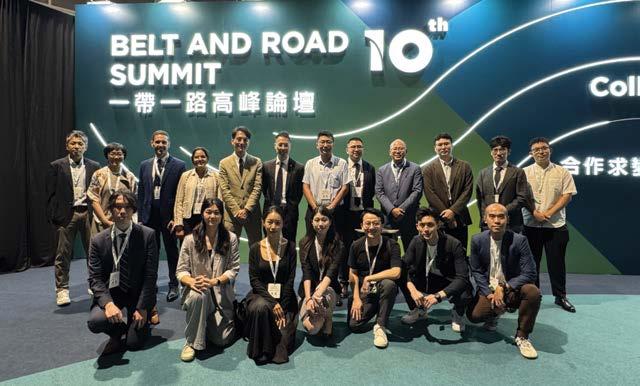
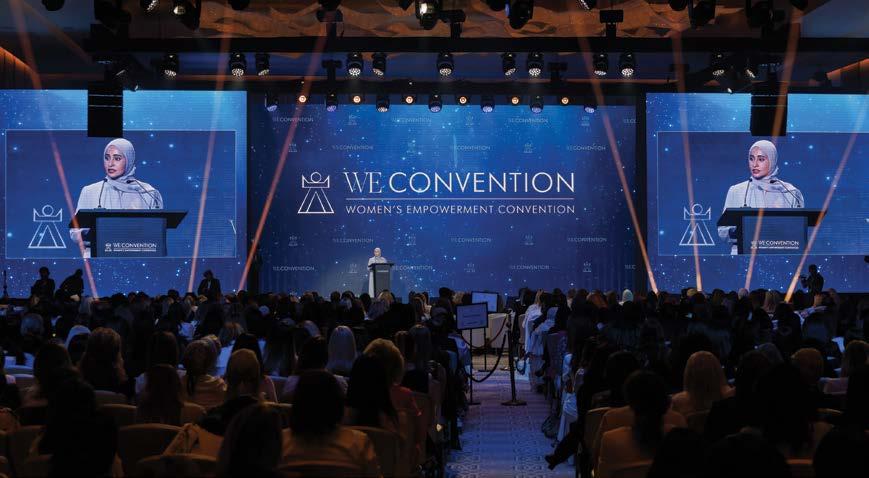
From November 1–2, 2025 the WE Convention (Women’s Empowerment Convention) — the world’s largest women’s empowerment event organized by the WE Council — brought together over 100 worldrenowned speakers and 2,500 participants representing more than 100 countries at the Atlantis The Royal.
The UAE, other GCC nations, the United Kingdom, the United States, CIS countries, and the European Union were among the top regions represented at the event. All tickets for the WE Convention sold out nearly a month before the event began, proving the growing global interest in women’s empowerment.
H.E. Ohood Al Roumi, Minister of State for Government Development and the Future. Image courtesy WE Convention
“This year’s WE Convention has exceeded every expectation — in scale, impact, and spirit,” said Mila Semeshkina, founder of the WE Convention. “We have grown not only in numbers but in the depth of dialogue, the excellence of our speakers, and the engagement from our global audience. Our voice is now heard by over a billion women worldwide. Each year, the WE community becomes stronger, more ambitious, and more united in shaping the future of women’s leadership.”


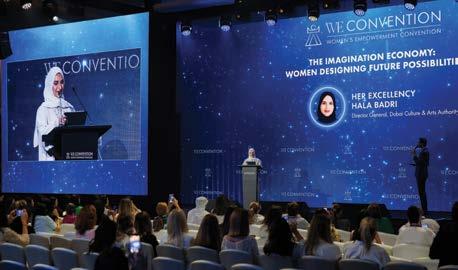
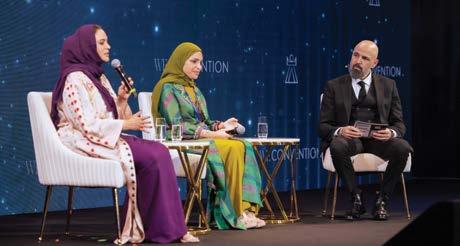
Under the theme “ALL IN: Career, Money, and Life,” this year’s WE Convention examined the power of financial independence and the diverse ways women around the world are defining success on their own terms. The two-day program featured 24 keynote sessions, 14 thought-provoking roundtables with industry leaders, 6 hands-on workshops, 4 topic-specific professional meetups, and 42 personal mentorship meetings. The discussions spanned key topics such as
redefining women’s roles in business, building global brands, fostering innovation, advancing the creative economy, and exploring how artificial intelligence is shaping the future of entrepreneurship.
In a powerful address, Dame Anna Wintour, Chief Content Officer at Condé Nast and Global Editorial Director of Vogue, shared her insights on women’s leadership, perseverance, and ongoing challenges that remain. “Of course the glass ceiling still exists
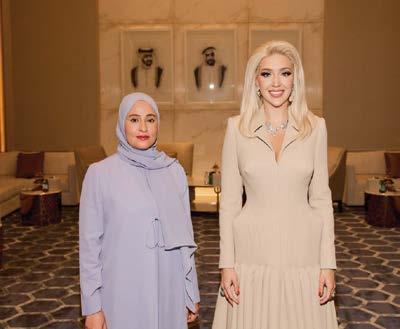
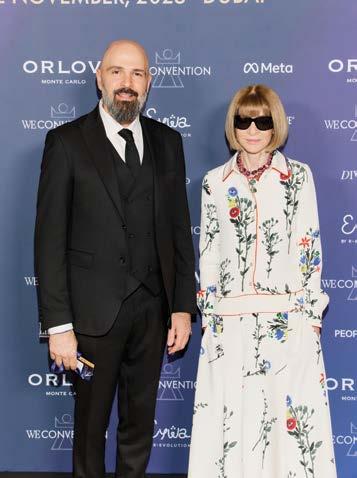
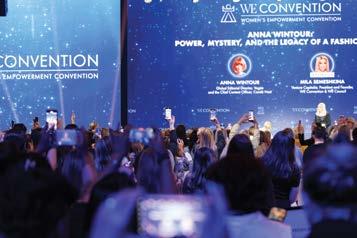
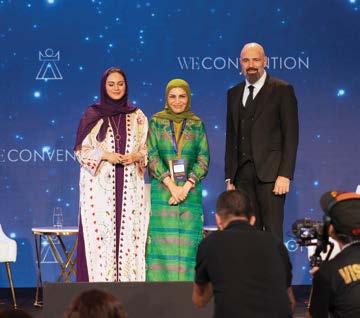
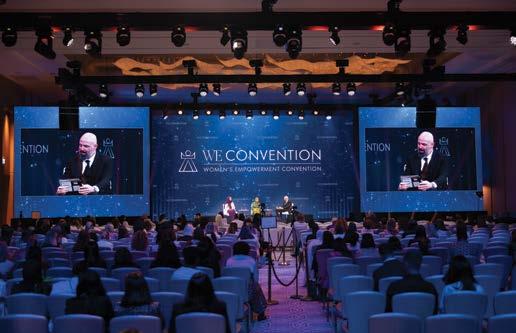
for women. And we just have to keep knocking on the glass and we will get there. We have to use our voices and our platforms. We have to stand up for what we believe in,” Wintour said.
Turning to the theme of leadership, Wintour emphasized the importance of collaboration and constructive disagreement. “As a leader, I believe in surrounding myself with people I trust and genuinely enjoy working with, individuals who bring diverse ways of thinking to the table. I empower my team to make their own decisions; I don’t micromanage, I let people do what they’re best at. For me, my strength is not in doing everything but in recognizing talent and good ideas in others,” she shared.
Wintour also spoke about balance and passion as the foundations of lasting success. “I always get up early, but in terms of the work day, no two days are the same. Weekends are very important to me, they are a time to unwind, read, play sports, walk my dogs and

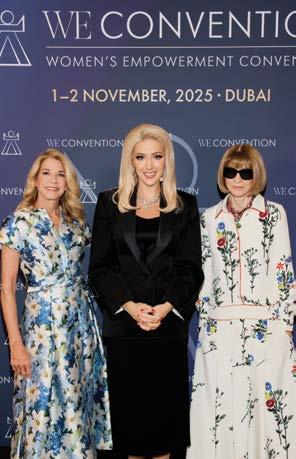
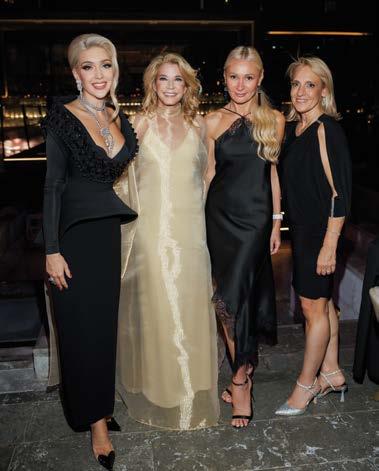
watch movies. I also make sure to leave work at a normal hour and I am a great theatre-goer. That balance is so important, and I encourage my team to do the same as well,” she concluded.
In an inspiring conversation, Candace Bushnell, international best-selling author and creator of the globally acclaimed series “Sex and the City,” reflected on the power of independence, ambition, and the enduring impact of her work on generations of women around the world. “Even as a little girl, I realized I didn’t think the way women were expected to think,” Bushnell shared. “In the 1960s, women were often encouraged to pursue only a few professions. I wanted to show women a
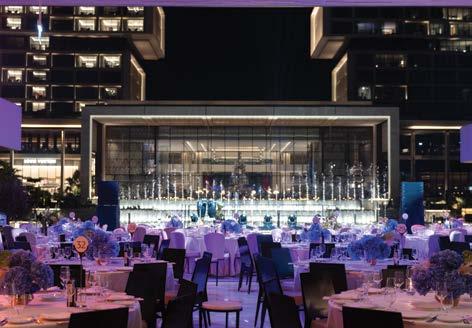
different way to think and a different way to look at their lives. Young women today are so bold and accomplished. They’re not afraid to be on their own,” she added.
Discussing career and life, Bushnell was direct.
“The most important thing is being independent and making your own money,” she said.
“Always have some part of yourself you can rely on. My one piece of advice to young women would be simple: focus on building your confidence and independence. Financial empowerment gives women freedom, security, and choice.” She concluded by underscoring the value of women supporting one another.
“Women need to come together more to lift
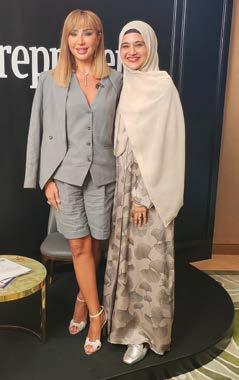
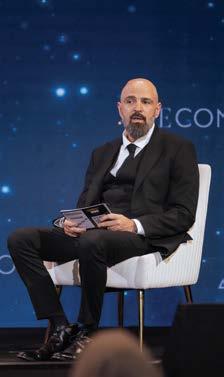
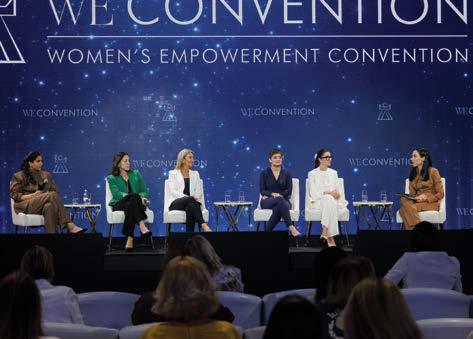
each other up,” Bushnell said. “We’re stronger when we stand side by side and celebrate each other’s success.”
The impressive speaker lineup also included prominent government leaders H.E. Ohood Al Roumi, Minister of State for Government Development and the Future, and H.E. Hala Badri, Director General of Dubai Culture & Arts Authority. Business leaders included Dr. Maky Zanganeh, U.S. self-made billionaire and Co-CEO & President of Summit Therapeutics; Amira Sajwani, Managing Director of Sales & Development at DAMAC Properties; Mary Gukasyan, Managing Director of Kraft Heinz Middle East & Africa; Mirna Arif, General Manager for Middle East and Africa Growth Markets; Alina Nazarova, Director of Premium and Private Banking at Alfa-Bank; Nisha Jagtiani, Group Director of Landmark Group; and Tina Ghafurian, Chief Operating Officer at Omorfia Group. The conference also welcomed celebrated athlete Nawal El Moutawakel, Olympic champion and Vice President of the International Olympic Committee; Grand Slam tennis champion and sports-fashion designer Svetlana Kuznetsova; celebrity and entrepreneur Joelle Mardinian; and Angela Orlov, Co-Founder and Head of Design at ORLOV Jewelry.
In addition to the main event, the WE Night on November 1 at the Michelin-acclaimed estiatorio Milos, located at Atlantis The Royal, proved to be one of the most notable social events in Dubai’s vibrant nightlife scene. The evening featured red-carpet arrivals, a fashion show by ORLOV Jewelry, a display of Schiaparelli Couture, a musical performance by Jodok Cello, a gourmet dinner, and high-level networking.
